|
October 14, 2017 - No. 32
Rounds Three and
Four NAFTA Negotiations
Talk of Workers'
Rights and Poison Pills
to Conceal Expansion of
U.S. Authority in Canada
- Enver Villamizar
-
PDF
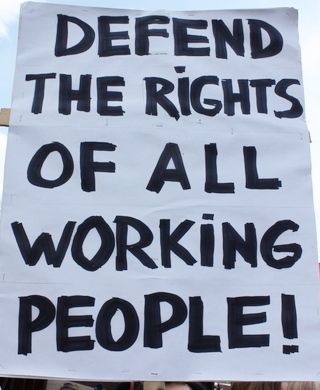  
Expansion
of
U.S.
Authority
Over
Canada
• Hearings on Electricity Grid Are
Not About a
Healthy Natural Environment
- Louis Lang -
• Approval of New Private Border
Crossing
- Margaret Villamizar -
• Bill C-21 An
Act
to
Amend
the
Customs
Act
- Charlie Vita -
• House of Commons Adopts U.S.
Sanctions Legislation
- Mira Katz -
Origin of Violence and
Anarchy in the U.S.
• Searching for a Motive for Las Vegas
Massacre
- K.C. Adams -
• State-Organized Violence and the
Ideological Crib
- Ken Tanner -
Anti-War Actions on
16th
Anniversary of Invasion of Afghanistan
• End the Occupation Now! U.S. and
NATO Out of Afghanistan!
Canada Out of NATO!
• All U.S. Troops Home Now
- Voice of Revolution -
• U.S. Senate Passes 2018 Defense
Authorization Bill
Puerto Rico
• Militarization of Hurricane
Relief
- Voice of Revolution -
• The United States Has a
Responsibility It Has Not Been Fulfilling
- Digna Sánchez Jiménez -
• Hurricanes Expose Destructive
Force of U.S. Colonialism
- Interview, José E. López -
Cuba
• Response to Unfounded U.S. Allegations of
Health "Attacks"
on Its Embassy Personnel in Havana
• People of Villa Clara Pay
Tribute to Che
• Tribute to Che Held in Ottawa
• Coming Events
Rounds Three and Four NAFTA Negotiations
Talk of Workers' Rights and Poison Pills to
Conceal Expansion of U.S. Authority in Canada
- Enver Villamizar -
The third round of NAFTA negotiations took place
between September 22 and 27 in Ottawa while round four began on October
11 and concludes October 15 in Arlington, Virginia.
Ottawa Round
The Ottawa round of NAFTA negotiations revealed the
concerted attempt by the ruling class of Canada, the United States and
Mexico to divide the working class of the three countries using
disinformation about workers' rights. The Trudeau government in
particular wants the working people of all three countries to rally
behind its neo-liberal conception of labour rights contained in the
text of the Trans-Pacific Partnership (TPP) agreement, in opposition to
the view of U.S. President Donald Trump and his administration.

The Trudeau government seems to have set for itself the
task
of convincing the working class to leave decision-making in the
hands of the monopolies and their representatives, and trust that
an outcome favouring working people will emerge from those who
exploit them. This is an illusion to say the least. The only way
an outcome can emerge favouring the working class is if it
empowers itself to lay its own claims to what belongs to it by
right and activates the strength of its numbers and organization
to uphold the rights of all.
The attempts of the governments of Canada, the U.S. and
Mexico to present themselves as the defenders of workers shows
how disempowered workers have become during this period of retreat of
revolution. It underscores the urgent necessity to organize the
working class with its own institutions that speak on its own
behalf and expose fraudulent posturing of imperialist leaders
whenever it occurs.
Several Canadian union leaders as well as
representatives of
the Democratic Party and unions in the U.S. have become cheerleaders
and even official spokespersons for
the proposals put forward by the Trudeau government relating to
workers' rights.
Those proposals are said to include demands to eliminate the
ability of U.S. states to pass right-to-work
legislation.[1] They are
presented as measures to "level the playing field" between the U.S. and
Canada for the monopolies.
The Trudeau government is pushing this
public relations stunt at a time governments and companies in Canada
increasingly refuse to negotiate and instead dictate wages and working
conditions. Besides this, thousands of temporary foreign workers are
brought from countries like Mexico to work in the greenhouses in
Ontario, for example. These workers have no legal right to unionize or
to
receive workers' compensation and they are exempt from labour standards
such as the minimum wage, maximum hours of work and minimum rest and
eating periods.
Meanwhile, the Trump administration also postures as
pro-worker. Its demands in the negotiations are said to mirror labour
provisions in the TPP as well as those in a 2007 agreement passed by
the U.S. Congress in the context of trade deals being negotiated with
Central and South American countries. The U.S. Trade Representative's
spokeswoman Emily Davis said the U.S. proposals favour U.S. workers as
well as those in Canada and Mexico.
"With President Trump as one of labour's biggest
supporters,
the United States has put forward a detailed proposal that
replaces the original NAFTA's toothless approach on labour with
enforceable provisions to benefit workers across America," Davis
said. "The United States' advocacy for workers includes seeking
commitments from Mexico and Canada to respect collective
bargaining and other core labour standards," she added.
The various factions of the ruling elite in North
America are
clamouring that they are the true representatives and friends of
the working class. Such a situation would suggest to the gullible
and naïve that the working class has no problems and no need for
its own organizations, outlook and voice because its
contradiction with the ruling imperialist elite has magically
disappeared.
The TPP stipulates that member countries should adopt
and maintain the labour rights of the International Labour Organization
(ILO). It also calls for all members to end child labour and forced
labour, and to allow workers to form unions and bargain collectively.
It requires a minimum wage, and safety and health standards meant to
prevent common abuses like overcrowding, fire hazards, and overwork.
"But the document does not specify how any of those measures should
work," The Atlantic
magazine points out. Nor do the TPP or ILO documents make clear that
without a powerful independent working class movement that enforces the
recognition and upholding of workers' rights in deeds, the fine words
printed on a paper or mouthed by some imperialist politician are
worthless.
These agreements with high-sounding words on labour
rights
are nothing new for U.S. imperialism. In fact, they are part of its
arsenal to force countries to subject themselves to U.S. demands at the
behest of the most powerful monopolies. They seek to undermine the
sovereignty of
nations and their independent development. One way is to incorporate
workers of developing countries into an international labour market
where workers compete to sell their capacity to work, and the
monopolies hire educated workers from those developing countries
without recognizing the institutions responsible for educating the
youth and compensating those institutions and the country for the value
they put in the educated workers.
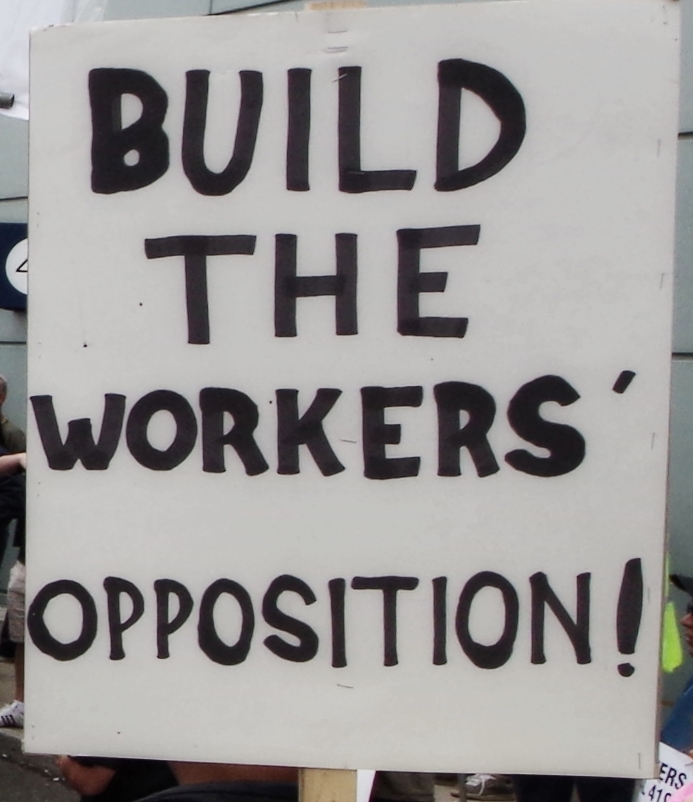 Any talk about upholding
workers' rights is a farce given that
the aim of NAFTA is to establish Fortress North America by
eliminating standards for the working people of all three
countries in the name of "flexibility" and "increasing
competitiveness." Any talk about upholding
workers' rights is a farce given that
the aim of NAFTA is to establish Fortress North America by
eliminating standards for the working people of all three
countries in the name of "flexibility" and "increasing
competitiveness."
The interests of the working class are diametrically
opposed
to those of the imperialist monopolies. Those who call themselves
labour leaders would do well to organize their members to oppose
the neo-liberal anti-social offensive in concrete ways and stop
trying to demobilize the workers' resistance struggles with calls
and attempts to leave decision-making in the hands of the global
monopolies and imperialist governments that represent their
interests.
The working class is responsible for bringing into
reality an
outcome that favours itself. It should not go cap in hand to
those who profit from exploiting workers' capacity to work and
beg for something good to happen. The working class can and must
empower itself by laying its own claims to what belongs to it by
right, and activating its superior numbers and organization to
ensure this happens in practice.
Fourth Round: Alarm Bells and "Poison Pills"
The fourth round of negotiations saw intensified
factional
struggle within the ruling class of Canada, the U.S. and Mexico.
One faction is sounding the alarm that Donald Trump has inserted a
number of "poison pills" into the text being negotiated, aimed at
killing a renegotiated NAFTA. These include demands to change
rules of origin for autos, scrap the Chapter 19 dispute
resolution measure, as well as open up Canada's supply management
sector.[2]
"I happen to think that NAFTA will have to be
terminated if
we're going to make it good. Otherwise, I believe you can't
negotiate a good deal," Forbes quotes Trump saying in an
October
10 interview. The TPP "would have been a
large-scale version of NAFTA. It would have been a disaster. It's
a great honour to have -- I consider that a great accomplishment,
stopping that. And there are many people that agree with me.... I
like bilateral deals," he added. In Canada this anti-NAFTA rhetoric is
used to cause alarm
amongst the people and to try to embroil them in siding with one
faction of the ruling elite against another. Instilling in people an
irrational fear of losing NAFTA seeks to stop them from thinking
differently and organizing for a pro-social nation-building alternative
in opposition to monopoly-controlled NAFTA and Fortress North America.
 The government of Justin
Trudeau is no different than any other since NAFTA was first
negotiated. It caters to U.S. domination. Nowadays it tries to divert
attention from its actions in submitting Canada to U.S. authority and
jurisdiction across the board. That Trudeau travelled to Washington to
address the U.S. Congress' Ways and Means Committee, which is being
lobbied to challenge Trump's authority to terminate NAFTA should he do
so, also shows the extent to which Canada is becoming completely
entangled in the factional fighting of the monopolies and their
political representatives within Fortress North America.[3] The government of Justin
Trudeau is no different than any other since NAFTA was first
negotiated. It caters to U.S. domination. Nowadays it tries to divert
attention from its actions in submitting Canada to U.S. authority and
jurisdiction across the board. That Trudeau travelled to Washington to
address the U.S. Congress' Ways and Means Committee, which is being
lobbied to challenge Trump's authority to terminate NAFTA should he do
so, also shows the extent to which Canada is becoming completely
entangled in the factional fighting of the monopolies and their
political representatives within Fortress North America.[3]
Reports in this edition of TML Weekly reveal
that talk
of Canada having "red lines" not to be crossed in negotiations
over NAFTA is a fraud to cover up the reality that these
negotiations are about Canada becoming more and more enmeshed
in Fortress North America. The establishment of corridors of
various types, giving the U.S. carte blanche to exercise
authority over Canadian territory and citizens and expand its military
control over Canada attest to the Trudeau government's fraudulent
posturing as the biggest defender of Canada's interests. These
developments reveal the importance of the working class and people not
falling prey to the attempts to embroil them in the factional fight to
make NAFTA "fair" or to save it.
Notes
1. Unifor President Jerry Dias
has indicated that Canada is
also "pushing Mexico on its corporate-sanctioned unions, [...]
agitating for both countries to offer a year of paid family
leave, as Canada does."
On September 26, Christopher Monette, spokesman for
Teamsters
Canada said, "The U.S. continues to qualify the Canadian labour
proposal as non-substantive, not serious." Dias accused the U.S. side
of the same thing, saying, "I
don't think the Canadian team is thrilled with [the American
text] because it falls short."
Teamsters International President James Hoffa, a member
of two advisory committees to the U.S. Trade
Representative, said, "I have seen the first draft of the U.S.
proposal on worker rights and it is inadequate.... The Canadian
text, however, goes farther and even addresses American
right-to-work laws that depress wages and therefore attract
companies in a 'free trade' race to the bottom. I urge the U.S.
negotiators to work with us and with their Canadian counterparts
to craft a labour chapter that will raise standards and wages
throughout North America. Anything less should not be a starting
point for these negotiations. It is imperative that a NAFTA
replacement get it right when it comes to workers' rights."
Celeste Drake, trade policy specialist with the
American
Federation of Labor and Congress of Industrial Organizations
(AFL-CIO) said, "What Canada seems to be putting on the table
seems to be closer to addressing real-world problems."
U.S. Rep. Sander Levin, Democrat from Michigan, has
said
that
higher labour standards made synonymous with Canada's proposals
are a requirement for the Democrats to pass any renegotiated
NAFTA. "I think here the Canadian point of view is very clear and
I hope the U.S. point of view will be exactly the same.... In
fact, if we don't have something like that -- that gets at this
issue of an industrial policy based on the backs of workers -- I
don't think there would be very many Democrats who would vote for
a NAFTA renegotiated, whatever else was in (it)," Levin said.
2. Tom Donohue, U.S. Chamber of
Commerce, was quoted as saying,
"There are several poison pill proposals still on the table that
could doom the entire deal.... All of these proposals are
unnecessary and unacceptable. [...] Ladies and gentlemen, we've
reached a critical moment. And the Chamber has had no choice but
ring the alarm bells." The Chamber intends to send the Trump
administration a letter signed by more than 300 state and local
chambers expressing support for NAFTA.
U.S. international trade lawyer Dan Ujczo working for
the
firm Dickinson Wright is quoted saying, "I'm becoming more and
more of the view that the proposals we're seeing are poison
pills. These are proposals that neither Canada nor Mexico can
accept."
Robert Zoellick, the former World Bank president and
ex-U.S.
Trade Representative under George W. Bush, speaking of Canada's
insistence on including Chapter 19 in the original Canada-U.S.
Free Trade Agreement said, "The Canadians spilled blood on this
to get this done. It is a very big stretch in my mind to believe
that any Canadian government can walk away without a Chapter 19
provision."
Unifor President Jerry Dias echoed the sentiment
saying,
"It's going nowhere fast. It's clear. The U.S. has some
ridiculous proposals on the table. You only put those types of
proposals on the table if you're not looking really to find a
deal."
3. The Ways and Means Committee
of the U.S. Congress has
jurisdiction over "reciprocal trade" on behalf of the U.S.
Congress and specifically NAFTA. Its website describes its
jurisdiction over trade and tariff legislation as follows:
"The Committee on Ways and Means has responsibility
over
legislation relating to tariffs, import trade, and trade
negotiations. In the early days of the Republic, tariff and
customs receipts were major sources of revenue for the Federal
Government. As the Committee with jurisdiction over
revenue-raising measures, the Committee on Ways and Means thus
evolved as the primary Committee responsible for international
trade policy.
"The Constitution vests the power to levy tariffs and
to
regulate international commerce specifically in the Congress as
one of its enumerated powers. Any authority to regulate imports
or to negotiate trade agreements must therefore be delegated to
the executive branch through legislative action. Statutes
including the Reciprocal Trade
Agreements Acts beginning in 1934, Trade Expansion Act
of 1962, Trade Act of 1974, Trade Agreements
Act of 1979, Trade and Tariff
Act of 1984, Omnibus Trade
and
Competitiveness Act of 1988, North
American
Free
Trade
Agreement
(NAFTA)
Implementation
Act, Uruguay
Round
Agreements
Act, and Trade Act
of 2002
provide the basis for U.S. bargaining with
other countries to achieve the mutual reduction of tariff and
nontariff trade barriers under reciprocal trade agreements.
"The Committee's jurisdiction includes the following
authorities and programs:
"(a) The tariff schedules and all tariff preference
programs,
such as the General System of Preferences and the Caribbean Basin
Initiative;
"(b) Laws dealing with unfair trade practices,
including the
antidumping law, countervailing duty law, section 301, and
section 337;
"(c) Other laws dealing with import trade, including
section
201 (escape clause), section 232 national security controls,
section 22 agricultural restrictions, international commodity
agreements, textile restrictions under section 204, and any other
restrictions or sanctions affecting imports;
"(d) General and specific trade negotiating authority,
as
well as implementing authority for trade agreements and the grant
of normal-trade-relations (NTR) status;
"(e) General and NAFTA-related [Trade Adjustment Assistance Act (TAA)]
programs
for
workers,
and
TAA
for
firms;
"(f) Customs administration and enforcement, including
rules
of origin and country-of origin marking, customs classification,
customs valuation, customs user fees, and U.S. participation in
the World Customs Organization (WCO);
"(g) Trade and customs revenue functions of the
Department of
Homeland Security and the Department of the Treasury.
"(h) Authorization of the budget for the International
Trade
Commission (ITC), functions of the Department of Homeland
Security under the Committees jurisdiction, and the Office of the
U.S. Trade Representative (USTR)."
Through the Trade Promotion Act (TPA) of 2015 the
Congress
delegated the power to negotiate trade deals to the Obama
administration; however this Act expires on July 1, 2018. If Trump
wants to make changes to NAFTA he must notify Congress 180 days
prior to the changes coming into effect. Any unilateral
presidential changes must take place prior to July 1, 2018 unless
the TPA is renewed by Congress. Additionally, as Trump moves to
terminate NAFTA as it exists, more and more voices from within
the ruling class are calling for the Ways and Means Committee to
assert its jurisdiction and block any termination.

Expansion of U.S. Authority Over Canada
Hearings on Electricity Grid Are Not About a
Healthy Natural
Environment
- Louis Lang -

The bulk electrical grid is organized into regions on a
North America-wide basis
under the
North American Electric Reliability Corporation. (click to
enlarge)
The Trudeau government wants to make Canada a powerhouse
in the field of renewable or what is called green energy. This is
presented as an important measure to lower Canada's greenhouse gas
emissions. Discussion at a recent hearing into strategic electricity
inter-ties by the Standing Committee on Natural Resources reveals that
while the talk is about the natural environment, what is being worked
out is the establishment of new corridors and linkages within Canada
and between Canada and the United States to serve private interests and
bind Canada more tightly to the United States. These are the interests
which have seized control of natural resources by trampling the rights
of Indigenous peoples.
 Electricity, like other
forms of Canada's energy resources, comes under NAFTA's jurisdiction
and
is tariff-free between Canada and the United States. In fact, Canada's
major electricity generation and transmission grids have by and large
been constructed in order to serve the U.S. A contradiction has
emerged,
however, now that some Canadian provinces have already or will soon
eliminate coal-fired electrical production, or rely heavily on fossil
fuels for electrical generation, and do not have the infrastructure
required to import hydro-electric power from neighbouring provinces.
This is because to date those producing excess hydro-electric power
export the vast majority of it to the United States and do not have the
capacity required to transport it to neighbouring provinces. Electricity, like other
forms of Canada's energy resources, comes under NAFTA's jurisdiction
and
is tariff-free between Canada and the United States. In fact, Canada's
major electricity generation and transmission grids have by and large
been constructed in order to serve the U.S. A contradiction has
emerged,
however, now that some Canadian provinces have already or will soon
eliminate coal-fired electrical production, or rely heavily on fossil
fuels for electrical generation, and do not have the infrastructure
required to import hydro-electric power from neighbouring provinces.
This is because to date those producing excess hydro-electric power
export the vast majority of it to the United States and do not have the
capacity required to transport it to neighbouring provinces.
The bulk electrical grid is organized on a North
American
basis where the various regions are under the mandate of the
North American Electric Reliability Corporation (NERC), the
international regulatory body whose mission is to assure
"reliability and security of the bulk power system of North
America." Currently this includes only Canada and the United
States, but in January of this year Mexico signed a deal to also
come under its jurisdiction.[1]
One of the major issues which all three of the
governments
negotiating NAFTA are said to agree on is the importance of
locking Mexico's recent deregulation of its electricity and other
energy sectors into a new NAFTA. This refers in part to the fact
that Mexico exempted itself from Articles 605 and 607 of NAFTA's
Chapter 6 which relate to restricting the ability of Canada or
the U.S. to limit energy exports. The renegotiation of NAFTA is
expected to see Mexico come under Articles 605 and 607 of Chapter
6 officially, tying it into the "North American energy market" in
the hopes of blocking any future government from affirming its
sovereignty over the use and transmission of Mexican energy.
No consideration is given by those making the decisions
to
the need for the self-reliance of each country. How the U.S. uses
its control of the natural resources of Canada and Mexico to
impose its will and national interest over others is not
considered at all. Besides other things, expanding the
transmission of electricity to the U.S. in the name of lowering
the reliance of U.S. states on fossil fuels, is a way to free up
U.S. fossil fuels for use as an economic weapon against other
countries as well as to fuel its vast war machine, the biggest
greenhouse gas emitter in the world.
The working people of Canada, the U.S. and Mexico want
transportation links and the bounty of natural resources to be
used to benefit the people and all of humanity. Binding Canada
and Mexico under U.S. Northern Command as a secure source of fuel
and cannon fodder in economic and military wars against other
countries and peoples who refuse to submit to U.S. imperialism
will not do. An independent stand is required which affirms the
rights of all. A starting point is to demand that Canada withdraw
from NAFTA and for relations based on equality and mutual
benefit.
Note
1. NERC's area of responsibility spans
the continental United States, Canada, and the northern portion
of Baja California, Mexico. Its regions are:
- Florida Reliability Coordinating Council (FRCC)
- Midwest Reliability Organization (MRO)
- Northeast Power Coordinating Council (NPCC)
- ReliabilityFirst (RF)
- SERC Reliability Corporation (SERC)
- Southwest Power Pool, RE (SPP RE)
- Texas Reliability Entity (Texas RE)
- Western Electricity Coordinating Council (WECC)

Approval of New Private Border Crossing
- Margaret Villamizar -
On August 31, the day before the second round of
official NAFTA negotiations opened in Mexico, the Trudeau government
issued an Order-in-Council approving the construction of a new
privately-owned international bridge crossing between Windsor, Ontario
and Detroit, Michigan by the Detroit International Bridge Company. The
company is owned by U.S. transportation magnate billionaire Matty
Maroun and his family.
 The Trudeau government's
Order-in-Council gives the Detroit
International Bridge Company, which owns the Ambassador Bridge,
five years to construct the new span and demolish the existing
bridge. Many in the community do not believe it will demolish the
current bridge as the company has defied many other orders
against it by various levels of government. This is evidenced by the
fact that it has now been revealed that the permits on the U.S. side
require the current bridge to remain in place. The Order-in-Council
also hands over new public lands around the Ambassador Bridge for
the use of the private U.S. owners. The Trudeau government's
Order-in-Council gives the Detroit
International Bridge Company, which owns the Ambassador Bridge,
five years to construct the new span and demolish the existing
bridge. Many in the community do not believe it will demolish the
current bridge as the company has defied many other orders
against it by various levels of government. This is evidenced by the
fact that it has now been revealed that the permits on the U.S. side
require the current bridge to remain in place. The Order-in-Council
also hands over new public lands around the Ambassador Bridge for
the use of the private U.S. owners.
It is estimated that twenty-five per cent of all
Canada-U.S. commercial trade crosses the Windsor-Detroit border via the
Ambassador Bridge. Wikileaks revealed a cable sent from the U.S.
Embassy in Canada to Washington in November of 2005 that described the
two crossings as "arguably the two most significant pieces of critical
infrastructure along the entire frontier." To the U.S., "critical
infrastructure" means infrastructure it considers related to its
national security and therefore, for all intents and purposes, under
its control. It stands to reason that any Canadian government decision
concerning the Ambassador Bridge would be based on demands from the
U.S. government and would not be taken without its permission. Given
that the Order-in-Council was issued the day before the NAFTA
negotiations began in Mexico, it is likely that this is related to
those negotiations.
Despite its significance, the announcement came without
any
fanfare by the government of Canada and no minister came to do
a news conference. Instead, Member of Parliament Brian Masse,
in whose riding the Ambassador Bridge's new span is to be located,
was informed via a call from the media about the decision. The
government has not given any legitimate explanation for its
concession to the Detroit International Bridge Company.
The approval is a significant reversal of the
government's
position. The federal and Ontario governments have been actively
trying to block the construction of a new crossing by the Detroit
International Bridge Company and are supposed to be in the process of
using an estimated $4.8 billion in public funds to build another
crossing -- the Gordie Howe International Crossing and its U.S. customs
plaza. The Gordie Howe International Crossing is to be publicly funded
but mandated to be built and run on a public-private basis.
Some hold up Trump's demand that Mexico pay for a wall
on its
border with the U.S. as an exercise in humiliation. The fact that
the Canadian federal and Ontario governments are footing the bill
for this entire project, including the U.S. customs plaza,
reveals the humiliating position in which successive Canadian
Conservative and Liberal governments have placed Canada and
Canadians.
In 2012, to get around opposition to the new Gordie
Howe
International Crossing from the Michigan legislature, the Detroit
International Bridge Company and the people of Michigan, the Ontario
Liberal government of Dalton McGuinty and the governor of Michigan
cooked up what they called an "inter-local" agreement between the
Ontario government and a Michigan Fund to build the bridge which sought
to eliminate the jurisdiction of the elected Michigan legislature.[1]
As recently as September 14, the Detroit International
Bridge
Company continues to oppose the U.S. federal government's
approval of the Gordie Howe International Crossing on the basis
that the decision was made improperly and that it interferes with
their right to make maximum profits from their own crossing. It
launched a similar suit under NAFTA's Chapter 11 Investor-State
Dispute Resolution mechanism against the Canadian government
although it was dismissed in April of 2015 on the basis that the
NAFTA tribunal did not have jurisdiction given that the case was
being heard in the United States District Court for the District
of Columbia.
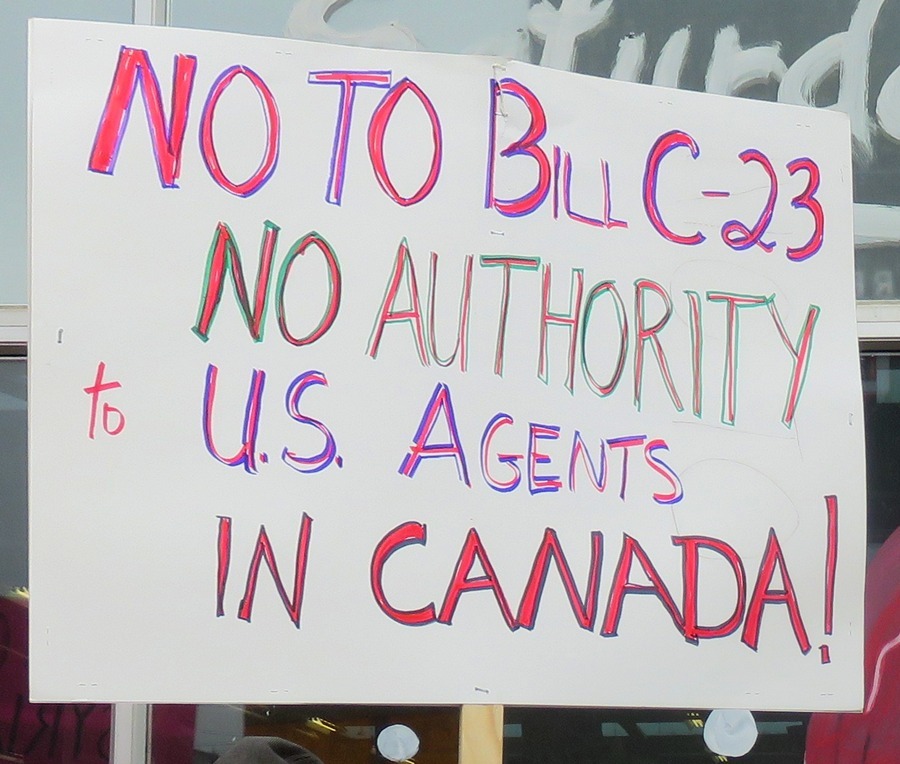 The Canadian government's
reversal of its position concerning the Ambassador Bridge indicates the
way in which deals are being made as part of the NAFTA negotiations
over strategic trade routes between Canada and the United States
without the participation or knowledge of Canadians. It should be
remembered
that the Trudeau government is also rushing to pass its Bill
C-23, An Act respecting the preclearance of persons and goods
in Canada and the United States, which will surely be used
to authorize the placement of U.S. Homeland Security agents on
Canadian soil to clear goods and people as they seek to cross the
current and new Ambassador Bridge as well as an eventual Gordie
Howe International Crossing unless that is abandoned altogether. It
is highly likely that part of the approval of the permits for the
Detroit International Bridge Company is linked to secret deals to
put in place as swiftly as possible pre-clearance at the
Windsor-Detroit border and on this basis give the U.S. control
over one of the most strategic Canada-U.S. border crossings. The Canadian government's
reversal of its position concerning the Ambassador Bridge indicates the
way in which deals are being made as part of the NAFTA negotiations
over strategic trade routes between Canada and the United States
without the participation or knowledge of Canadians. It should be
remembered
that the Trudeau government is also rushing to pass its Bill
C-23, An Act respecting the preclearance of persons and goods
in Canada and the United States, which will surely be used
to authorize the placement of U.S. Homeland Security agents on
Canadian soil to clear goods and people as they seek to cross the
current and new Ambassador Bridge as well as an eventual Gordie
Howe International Crossing unless that is abandoned altogether. It
is highly likely that part of the approval of the permits for the
Detroit International Bridge Company is linked to secret deals to
put in place as swiftly as possible pre-clearance at the
Windsor-Detroit border and on this basis give the U.S. control
over one of the most strategic Canada-U.S. border crossings.
In all of this the concerns of those who are to live
around
the Ambassador Bridge and in the west end of Windsor, who have long
suffered
elevated levels of cancer and other diseases which are linked to
elevated levels of air pollution produced by diesel emissions
from the thousands of trucks passing there, have been completely
dismissed and suppressed. It has been a longstanding demand of the
people especially since September 11, 2001, that no expansion of the
Ambassador Bridge be considered by the Canadian government because it
runs right through the community and over the University of Windsor.
This is due to their experience of U.S. Customs deliberately slowing
traffic on the bridge down to a trickle following the 9/11 attacks and
again following Canada's refusal to join the war in Iraq, backing up
Windsor streets with long lines of idling trucks. The people living in
those areas have demanded that truck traffic be moved out of their
neighborhoods and the city so as to reduce the levels of pollution and
traffic congestion they are forced to live with.
The Trudeau government has effectively thrown these
citizens
under the bus and even handed over sections of public roads and
neighborhoods to a private U.S. billionaire who will no doubt
seek to have them secured by U.S. Homeland Security and out of
Canadian jurisdiction as "critical infrastructure." This after years
and years of consultations held on a new bridge with the residents
affected by the current one. While the Trudeau government presents
itself as the champion of consultation and listening to the people, its
180 degree reversal on this matter shows that this is a sham to hide
who it is that makes important decisions over what happens in Canada.
Note
1. See "New
Privately-Controlled
Public
Authorities
Established
Through
Windsor-Detroit
Crossing
Agreement,"
TML
Weekly, July 21, 2012.

Bill C-21 An Act to
Amend the Customs Act
- Charlie Vita -
Parliament resumed on September 18, following the
summer
break, in the midst of official negotiations of NAFTA. The
priority of the government as Parliament opened was clearly to
ensure that all the arrangements demanded by successive United
States governments to humiliate and subjugate Canada are in
place lest they become "irritants" to the Canada-U.S.
relationship and affect whatever it is Canada hopes to "get" in
return.
The first piece of government legislation put for
debate by the Liberals the day Parliament resumed was Bill C-21, An
Act to amend the Customs Act. This legislation is a result of an
agreement signed during Prime Minister Justin Trudeau's first official
visit to the White House under U.S. President Barack Obama. That
agreement also led to the tabling of Bill C-23, An Act
respecting the preclearance of persons and goods in Canada and the
United States, which greatly expands the powers for the Minister of
Public Safety to place U.S. border agents at Canadian ports and
manufacturing facilities to enforce U.S. jurisdiction. The two pieces
of legislation are a combination of measures to strengthen U.S.
authority and provide it jurisdiction to wield its police powers in
Canada.
In particular, Bill C-21 permits the Canadian security
agencies to receive from U.S.
security agencies and to share with them information on Canadians
exiting Canada into the United States.[1]
This is similar to how Canada hands
over to the U.S. information on
American citizens and anyone else leaving Canada for the United
States. Through such arrangements, a "seamless" North American
border control system is being finalized under U.S. control in
which the border agencies of Canada as well as Mexico become arms
of U.S. Homeland Security and operate on the basis of its
systems, regulations and definitions.
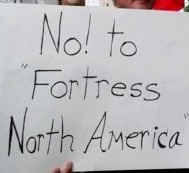
According to a government backgrounder issued when Bill
C-21
was tabled: "Once this legislation is passed, Canada will now
know when and where someone enters the country, and when and
where they leave the country." It presents the legislation as
closing a "loophole" that Canada does not currently receive
this information from the United States on its own citizens or others.
This deliberately hides why they want to know and whose interests are
behind this legislation.
The legislation is based on the false premise that
Canadians,
Americans and Mexicans are a threat to Fortress North America and
that the governments of the three countries must strengthen their
powers to police their own people in order to defend North
American security. With this and other pieces of legislation, the
government is eliminating existing arrangements that are based on
the notion that Canada or Mexico are sovereign countries.
Today, information handed over to U.S., Mexican and
Canadian authorities
is used
to fill databases overseen by the United States, which it uses to
profile human beings based on their travel patterns, background,
age, gender etc., to target some as "potential risks." In the
name of information-sharing and cooperation for security, the
Canadian state is strengthening the police powers of U.S. security
agencies to target human beings based on who they are rather than any
crime they may have committed or are accused of committing. This
permits the security agencies to
target people for discrimination, harassment and persecution and
is unacceptable. Such measures were put in place under the Harper
and Obama regimes and they are now being clinched by the Trudeau
and Trump regimes. Irrespective of what government oversaw these
measures they are contradictory to the modern notion that
people's security lies in the affirmation of their rights.
The Conservatives' only objection is to not being given
enough credit for having set the table for this legislation under
Harper and the slowness of the Liberals in getting it passed. The NDP
is calling for "re-consideration" of the legislation, based on the
notion that such measures were not a fundamental problem with the Obama
administration in power, however, now it is a problem with Trump in
power. In this way the principle of Canadian sovereignty and Canada's
right to decide its own affairs is eliminated from any discussion and
instead the basis for "debate" is to hide the nature of U.S.
imperialism and Canada's ongoing submission to it. Such a "debate" does
not inform the people about what is taking place so that they can unite
in action to uphold their national, collective and individual rights.
The working class of Canada and Quebec and the
Indigenous peoples
are human
beings with rights, most importantly the right to decide the
affairs that affect their lives. Any illusion that this
legislation and other laws like it are only now an issue with a Trump
presidency are aimed at diverting the people from directly challenging
U.S.
imperialism's program to eliminate any sovereign decision-making
in Canada. These measures are part and parcel of the NAFTA
negotiations because they are related to establishing Fortress
North America, which subjects the over 450 million people of
Canada, the U.S. and Mexico to the authority of U.S. imperialism
at every level.
Governments and representatives of Parliament or
legislatures
that are facilitating this violation of the rights of the peoples
of the three countries or actively hiding it, are unfit to govern
and in contempt of their duty to their constituents as public
officials. They must be replaced by a political movement of the
people for genuine independence and sovereignty which puts
forward politicians and governments who uphold the modern
principle that our security lies in the fight for the rights of
all.
Note
1. The following information is
to be shared by the U.S. with
Canada and in some cases is already being shared by the Canadian
government with the U.S.:
Biographic entry information (land mode)
"Biographic information includes: first name, middle
name(s),
last name, date of birth, citizenship or
nationality, [TML
emphasis added] sex, travel document type, document
number, and name of the country that issued the travel document.
In addition to the biographic information that Canada and the
U.S. currently collect on travellers at ports of entry, the date
and time of entry, as well as the port through which the
traveller entered, will be exchanged as part of the Entry/Exit
initiative."
By permitting citizenship or nationality to be
provided, the Canadian government is causing utmost confusion because
they are not synonymous. Only the person's current citizenship as
per the passport they travel on is relevant.
Biographic exit information (air mode)
"Biographic information includes: first name, middle
name(s),
last name, date of birth, citizenship or nationality, sex, travel
document type, document number, and name of the country that
issued the travel document. In addition, the date, time, and
location of departure as well as flight information will be
collected from air carriers for passengers leaving Canada on
board outbound international flights."

House of Commons Adopts U.S.
Sanctions Legislation
- Mira Katz -
On October 4 the Canadian House of Commons, with the
support of all parties, unanimously passed Bill S-226, An Act
to provide for the taking of restrictive measures in respect of
foreign nationals responsible for gross violations of
internationally recognized human rights and to make related
amendments to the Special Economic Measures Act and the
Immigration and Refugee Protection Act. Its short title is Justice
for
Victims
of
Corrupt
Foreign
Officials
Act
(Sergei Magnitsky Law).
The legislation is virtually an exact copy of a U.S.
law
entitled the Global Magnistky Human Rights Accountability
Act, signed into law by former U.S. President Barrack Obama
just prior to current U.S. President Trump taking
office.[1] The U.S. law expands
arbitrary Presidential powers to impose
sanctions on any foreign national alleged to be a human
rights abuser or corrupt. That such a law comes from the world's
biggest human rights abuser shows the depths of depravity to which
Canadian MPs have sunk in presenting Canada's copy-cat law as
a contribution to international human rights. Once passed in the Senate
where it originated and is sure to pass easily, the bill will be given
Royal Assent and become law.
The Canadian copy of the U.S. law provides for "the
taking of
restrictive measures in respect of foreign nationals responsible
for gross violations of internationally recognized human rights."
It amends the Special Economic Measures Act, Canada's
current sanctions legislation and the Immigration and Refugee
Protection Act to establish a new loophole through which the
Prime Minister and the Cabinet can target foreign nationals and
Canadians alleged to be providing financial or other services to
them, related to their alleged wrongdoing.
It expands the arbitrary powers of the government
beyond what is currently permitted in the Special Economic Measures Act to
impose sanctions on foreign nationals and criminalize Canadians said to
be engaged in dealings involving property belonging to such persons or
the provision of services to them. Currently the Special Economic Measures Act
limits the government's ability to impose sanctions to either of the
following situations:
- where an international organization or association to
which
Canada belongs calls on its members to take economic measures
against a foreign state; or
- where a grave breach of international peace and
security
has occurred and is likely to result in a serious international
crisis.
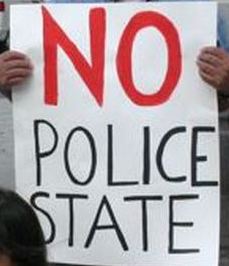 The new law reflects the
fact
that more and more the
Canadian
state wishes to wield Canada's territory and resources as a
weapon against those the U.S. declares its enemies. Now economic
sanctions and a travel ban (inadmissibility to
Canada) can be imposed against anyone listed under the Sergei
Magnitsky Law, thus expanding the ability of Canada's border,
police and spy agencies, joined at the hip with U.S.
Homeland Security, to target foreign nationals and their family
members as well as Canadians. The new law reflects the
fact
that more and more the
Canadian
state wishes to wield Canada's territory and resources as a
weapon against those the U.S. declares its enemies. Now economic
sanctions and a travel ban (inadmissibility to
Canada) can be imposed against anyone listed under the Sergei
Magnitsky Law, thus expanding the ability of Canada's border,
police and spy agencies, joined at the hip with U.S.
Homeland Security, to target foreign nationals and their family
members as well as Canadians.
Mirroring the U.S. Magnitsky Act, the law enables the
government
to issue orders relating to the property of a designated foreign
national who the government decides is "responsible for or
complicit in gross violations of internationally recognized human
rights against whistle-blowers or human rights defenders." Like
the U.S. law, it allows orders relating to property to be issued
against a
foreign national who is a government official of a foreign state
and who is responsible for, or complicit in, ordering,
controlling or otherwise directing "acts of significant
corruption." Examples of such corruption are taken right from the
U.S. legislation: the expropriation of private or public assets
for personal gain; corruption related to government contracts or
the extraction of natural resources; bribery; or the facilitation
or transfer of the proceeds of corruption to foreign
jurisdictions.
The legislation permits the government to interfere
with the
ability of Canadian citizens or entities to provide financial or
related services to those foreign nationals listed under the law. It
also imposes a requirement on businesses to monitor whether they are in
possession or control of property of or providing services to a person
or persons subject to an order under the legislation.
The law calls for the House of Commons and the Senate
through
designated committees to annually review the legislation and those
listed and gives them the ability to
recommend additions and
deletions.
Who Said What
In a statement about the bill's passing Third Reading
in the
House of Commons, Minister of Foreign Affairs Chrystia Freeland
said it "will enable Canada to sanction, impose travel bans on
and hold accountable those responsible for gross human rights
violations and significant corruption. This will ensure that
Canada's foreign policy tool box is effective and fit for purpose
in today's international environment. It will also provide a
valuable complement to our existing human rights and
anti-corruption tools."
Speaking for the Conservative Party during the debate
prior
to the October 4 vote, James Bezan (Selkirk -- Interlake -- Eastman)
spoke in similar terms, saying
the legislation "put another tool in the tool box for the
Government of Canada, so that we can project our Canadian values
and ensure that Canada is not being used as a safe haven by
corrupt foreign officials and human rights abusers. He underlined
the global reach of the bill, emphasizing that it extended far
beyond Russia. In addition to thanking Chrystia Freeland for her
support, he said, "I think all of us would be remiss if we did
not thank the huge diaspora in Canada: the Ukrainian diaspora,
the pro-democracy Russians in Canada, the Vietnamese community,
the Iranian community, and the Falun Gong and Chinese community
here. They believe that having this legislation in Canada, the Sergei Magnitsky Law,
would enable the Government of Canada to
hold those human rights abusers in their countries to account and
ensure that they do not hide their money or bring their families
and protect them here in Canada, and that we do not allow Canada
to be used as a safe haven. I thank all of them for their
support, petitions, and advocacy and holding seminars and
spreading the world about how important Bill S-226 is."
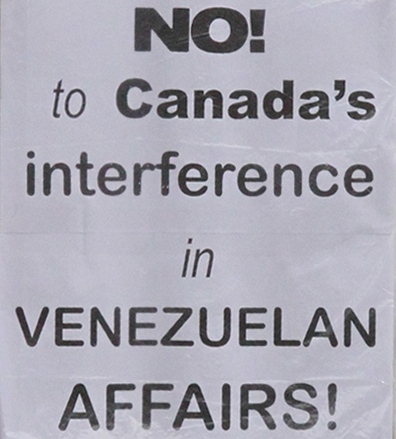 Bezan also singled out
Venezuela. Canada recently imposed sanctions on 40 high level
Venezuelan government and state officials. Without the Magnitsky Law yet in its toolbox,
the government had to resort to a manoeuvre with the U.S to create the
appearance it was applying "multilateral" sanctions since Canada's
existing economic sanctions legislation was designed mainly for the
implementation of such things as UN Security Council-mandated
sanctions. After citing the stock litany of lies repeated by those
pushing for regime change in Venezuela he said the new law would allow
for proper economic sanctions and travel bans to be put in place to
"send a message to Maduro and his regime." Bezan also singled out
Venezuela. Canada recently imposed sanctions on 40 high level
Venezuelan government and state officials. Without the Magnitsky Law yet in its toolbox,
the government had to resort to a manoeuvre with the U.S to create the
appearance it was applying "multilateral" sanctions since Canada's
existing economic sanctions legislation was designed mainly for the
implementation of such things as UN Security Council-mandated
sanctions. After citing the stock litany of lies repeated by those
pushing for regime change in Venezuela he said the new law would allow
for proper economic sanctions and travel bans to be put in place to
"send a message to Maduro and his regime."
Bezan praised the Liberals, saying their contributions
had
"cleaned up the bill and provided more strength and more tools
and mechanisms," including through the provision of a "fair
balance and right of recourse" to those whose names are added to
the list.
NDP MP Linda Duncan (Edmonton -- Strathcona) expressed
pleasure that the bill had all-party support and called its passage
long overdue. She said that what was important now was "watchdogging
the government so it actually delivers on it." Another NDP member,
Wayne Stetski (Kootenay -- Columbia) said his party had "long been at
the forefront of calling for targeted sanctions against those
responsible for human rights violations." He said the NDP had
"consistently called for Canada to coordinate our sanctions regime with
the United States and the European Union, and to tighten sanctions to
address major gaps."
Note:
1. The U.S. law authorizes the President to impose
U.S.
entry and property sanctions against any foreign person
(or entity) who the U.S. declares is involved in corruption or the
persecution of someone said to be exposing government
corruption. The law defines corruption as including "the
expropriation of private or public assets for personal gain,
corruption related to government contracts or the extraction of
natural resources, bribery, or the facilitation or transfer of
the proceeds of corruption to foreign jurisdictions."
The law authorizes "visa bans and a block on the U.S.
assets
of government officials anywhere in the world found violating
human rights, committing -- or assisting in -- "significant"
corruption, making graft by a foreign official punishable by U.S.
sanctions."
The U.S. legislation was introduced by Democratic
Senator Ben Cardin from Maryland, at the time ranking Member of
the Senate Foreign Relations Committee. In passing the
legislation Cardin said: "The U.S. has added a critical tool to
our diplomatic toolbox, making clear that gross violators of
human rights and those who engage in serious acts of corruption
cannot escape the consequences of their actions even when their
home country fails to act."

Origin of Violence and Anarchy in the U.S.
Searching for a Motive for Las Vegas Massacre
- K.C. Adams -
U.S. authorities and media are exhibiting angst over
not
finding a motive behind the recent mass shooting in Las Vegas.
Identifying a discernible motive appears necessary to exonerate
the U.S. state and society of responsibility for the anarchy,
violence and mayhem that permeate life in the United States and
its foreign affairs.
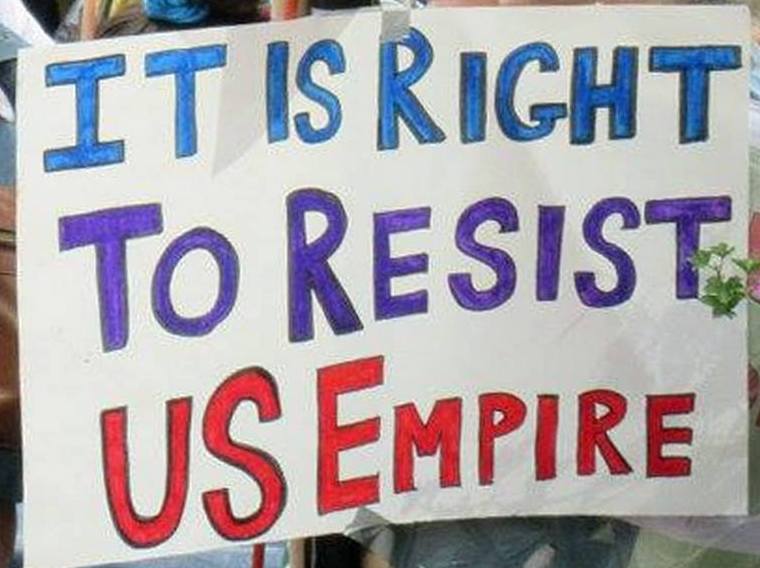 After each mass slaughter
and amid the continuing
violence of
U.S. cities, a tenuous motive is usually trotted out for the
individual or individuals involved. A motive is supposed to
explain the act, possibly provide some comfort or meaning to
those grieving their horrible loss, and when some evil intent is
identified inspire revenge and a desire for strengthened police
powers. But regardless of the motive, life and violence carry on
as before because the state-organized dictate that might makes
right in the defence of class privilege and empire-building
declares no alternative is allowed, no new direction or
pro-social aim for the economy and society is permissible. After each mass slaughter
and amid the continuing
violence of
U.S. cities, a tenuous motive is usually trotted out for the
individual or individuals involved. A motive is supposed to
explain the act, possibly provide some comfort or meaning to
those grieving their horrible loss, and when some evil intent is
identified inspire revenge and a desire for strengthened police
powers. But regardless of the motive, life and violence carry on
as before because the state-organized dictate that might makes
right in the defence of class privilege and empire-building
declares no alternative is allowed, no new direction or
pro-social aim for the economy and society is permissible.
A motive to explain the violence becomes a convenient
diversion to investigating and finding out why the U.S. is such a
violent society in its relations between the police powers of the
state and its members, amongst individuals and collectives
generally, and in the U.S. state's relations with the peoples and
countries around the world. A motive to explain the continuing
violence in the U.S. and with others abroad acts to divert people
from questioning why a society that can produce so much cannot
look after its own members, cannot establish modern relations and
methods of governance in conformity with the modern socialized
conditions of industrial mass production, and is continually at
war with peoples abroad, rejecting outright the peaceful resolution of
problems.
"Totally Destroy North Korea!"
The U.S. Commander in Chief in a speech at the UN
casually
threatens to "totally destroy North Korea." In a meeting with top
military leaders, the President tells assembled reporters that
this peaceful gathering in the White House is the "calm before
the storm," refusing to clarify what new storm the U.S. is
planning to unleash. The President himself calls on police forces
not to be so gentle when arresting suspects. His predecessor in
the Presidency unleashed drone warfare and U.S. Special Forces on
the peoples of the world in unprecedented waves, which continue
to escalate.
When hearing that his Secretary of State was opening
channels
of communication with the Democratic People's Republic of Korea,
the Commander in Chief publicly rebuked him and told him to stop
wasting his time. The U.S. has made it clear that it has no
intention to sign a peace treaty with the DPRK and remove its
thousands of troops and weapons of mass destruction from the
Korean Peninsula and Japan. Might is declared right to defend
class privilege and empire-building through violence, anarchy and
warfare.
The Aim of the Economy
The aim of the U.S. economy is to maximize private
profits
for the few who own and control the socialized economy at the
expense of the many. The aim violently contradicts the necessity
of a modern socialized economy to meet the needs of the people
and guarantee their rights from birth to passing away. The aim to
maximize private profits for a few comes into conflict with the
modern aim of an economy of industrial mass production to meet
the needs of all and humanize the workplace and the social and
natural environment.
Individuals are told and even exhorted to fend for
themselves in contradiction with a completely socialized economy on
which all depend for their livelihoods and existence. Those few who are
successful in building a personal empire through hereditary or natural
right are exalted and awarded class privilege and power over the rest
of the members of society. The motive to maximize profits for a few at
the expense of the many and build individual and collective empires of
class privilege governs the relations amongst the people. The police
powers of the state and mass cultural and ideological indoctrination
ensure class privilege prevails and that no other aim for the economy
or society emerges, and that the people are left without a social
consciousness and public opinion of what needs to be done to turn the
situation around, driving many crazy or leaving them unconcerned.
Might makes right to maximize profit for the few at the
expense of the many means inevitable violence and anarchy invades
all aspects of life at home and abroad. For 58 people to die from
gunshots in Chicago dating back from the time of the Las Vegas
massacre took only 28 days, in Baltimore 68 days, in Houston 118
days and on and on the violence escalates internally as even more
warships storm towards the Korean Peninsula for war games in
October and possible invasion of the DPRK, and U.S. Special
Forces' deaths are reported in violent encounters in faraway
Niger, Africa.
The people do not want to hear some specious motive or
psychological issue moved the Las Vegas shooter to slaughter his
victims. His motive and actions are fashioned within the cultural
and ideological cocoon of U.S. imperialism. Where else could such
acts originate? They do not just drop from the skies or emerge
spontaneously in the brain. The people want to hear of a new
direction for their economy and country with a new motive and
pro-social aim suitable for modern times that puts an end to
anarchy and violence at home and abroad.
 The U.S. is tearing itself
apart with its outmoded
motive,
aim and way of life based on class privilege and empire-building,
and is dragging down the world as well. The time is now for the
U.S., Canadian and Mexican working class and allies to stand up
to U.S. imperialism and be counted as part of this great humanity
and declare with conviction and determination to build the new
with a modern economy and aim to meet and guarantee the rights
and needs of all, where social love and peaceful relations
prevail amongst the peoples within North America and the peoples
of the entire world. The need to put an end to class privilege
and empire-building and withdraw the U.S. military from overseas
is paramount if humanity is to move forward and be allowed to
sort out problems peacefully. The U.S. is tearing itself
apart with its outmoded
motive,
aim and way of life based on class privilege and empire-building,
and is dragging down the world as well. The time is now for the
U.S., Canadian and Mexican working class and allies to stand up
to U.S. imperialism and be counted as part of this great humanity
and declare with conviction and determination to build the new
with a modern economy and aim to meet and guarantee the rights
and needs of all, where social love and peaceful relations
prevail amongst the peoples within North America and the peoples
of the entire world. The need to put an end to class privilege
and empire-building and withdraw the U.S. military from overseas
is paramount if humanity is to move forward and be allowed to
sort out problems peacefully.
The necessity for change is evident for all to see!
Reject the anarchy and violence of class privilege and
empire-building!
The time is now to build the new, a new direction for
the
economy and country with a modern motive and pro-social aim to
guarantee the rights and well-being of all and live in peace with
the peoples of the world!

State-Organized Violence and the Ideological Crib
- Ken Tanner -
The imperialists are doing everything they can to cover
up
the connection between the outburst of violence in Las Vegas and
U.S. state-organized violence at home and abroad. They call the
mass murder in Las Vegas a senseless act of violence, while the
violence the U.S. military unleashes daily on the world's peoples
makes sense because it occurs in the name of peace and democracy.
Likewise, the state-organized violence of the police powers used
against the people within the U.S. makes sense because it occurs
in the name of upholding the law and order of the state in the
defence of class privilege and private ownership of the
socialized economy.
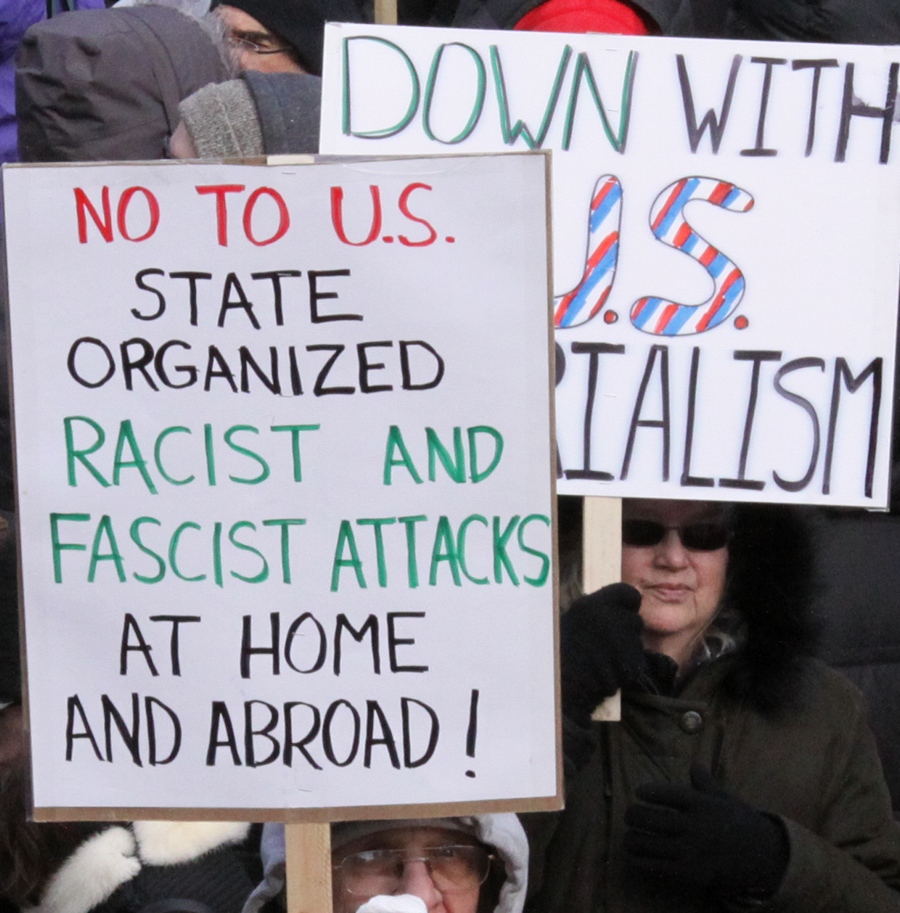
The U.S. state has unleashed anarchy, violence and
militarism
all over the world through their decades-long wars for conquest
and domination against the interests of the world's peoples,
their sovereign rights and human progress. The U.S. state is the
biggest producer of armaments and arms dealer in the world, has
the largest stockpile of weapons of mass destruction, has the
largest military by far with over 1,000 foreign military bases
and navy prowling the seas, and is the most prolific user of arms
in action throughout the world including within the U.S. itself
where police forces are heavily militarized.
The U.S. state uses its weapons all over the world,
killing
millions of people since WWII and destroying infrastructure and
means of production that the people depend on for their
well-being and existence. Through conquest and forced regime
change, the U.S. state steals produced-value from others,
especially from those countries struggling to make the transition
from petty production to modern industrial mass production.
Within the U.S., entire communities face continuous
state-organized police brutality from law enforcement personnel
armed to the teeth and given a license to kill so as to
intimidate the people. Rather than deal with the social,
political, and economic problems that have long plagued the U.S.
economy and society and its relations with others abroad, the
U.S. state has instead unleashed war and police brutality
treating all human beings at home and abroad as law and order
problems standing in the way of U.S. empire-building.
Within the U.S., mass incarceration with mega prisons
holding
2.5 million people is justified as necessary for the war on drugs and
to ensure class privilege continues its rule and monopoly over
the social wealth workers produce. The social consequences of an
economy whose aim is maximum profit for the few at the expense of
the many are never questioned. The people are expected to fend
for themselves. Such a dictum arising from the ruling elite of an
economy whose aim benefits only the privileged few, and inevitably
marginalizes millions and leaves them desperate, with many facing
civil death. This results in activity outside the legally
sanctioned theft of what belongs to the actual producers by
right. Individuals engaged in efforts to fend for themselves
within an economy whose aim denies them the right to participate
unless their work-time gives rise to maximum profits for a few,
are criminalized and dealt with harshly.
The U.S. state is concerned with defending a status quo
for
the privileged few, leaving millions of people facing the full
brunt of an economy whose aim does not include guaranteeing their
well-being and which regularly collapses in economic crises. The
notion of "every man for himself" permeates U.S. society, which
was founded and built to defend slave property and other forms of
private ownership of the means of production within a general
state-organized right of certain human beings to exploit other
human beings as chattel slaves or wage-slave workers who must
sell their capacity to work to acquire a living.
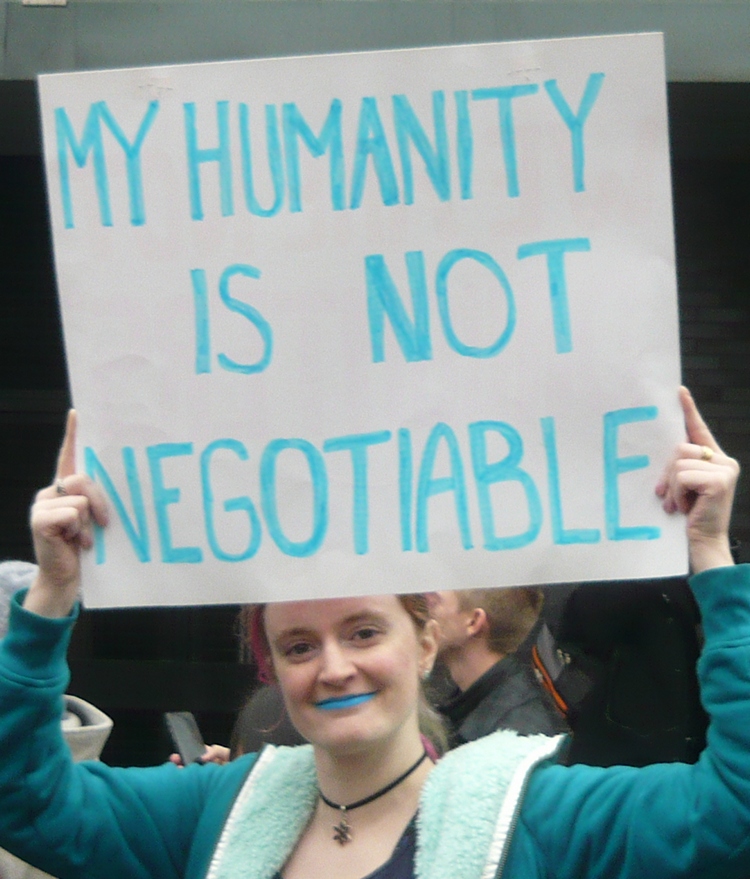 Those in control of the U.S. from
the beginning have
been
obsessed with their aim to enlarge social wealth for themselves
at the expense of the many and to extend their empire throughout
the world, first by violently expropriating and stealing the land
of the Indigenous peoples and enslaving Africans, and gradually
moving their empire into other regions of North America and
beyond, expanding the domination and control of the
U.S. empire throughout the world. Those in control of the U.S. from
the beginning have
been
obsessed with their aim to enlarge social wealth for themselves
at the expense of the many and to extend their empire throughout
the world, first by violently expropriating and stealing the land
of the Indigenous peoples and enslaving Africans, and gradually
moving their empire into other regions of North America and
beyond, expanding the domination and control of the
U.S. empire throughout the world.
The disorder within such a violent unstable society has
given
rise to a decadent culture where the human person is humiliated
and violated in every sense. Actions are explained
psychologically and not as a result of a social being living in a
country founded on theft, enslavement, exploitation, violence and
empire-building.
The unprecedented depravity of U.S. culture and sense
of
hopelessness arising from state-sanctioned class privilege and
empire-building has left millions of people suffering not only
physical anxiety from fending for themselves but also accompanied
with mental illness, anguish, and drug addiction. These social
phenomena are not recognized as problems of a social being living
in a society that officially sanctions class privilege,
state-organized violence, exploitation and absurd demands to fend
for yourself within a completely socialized economy. No, these
problems are identified mostly as psychological, the problems of
a malfunctioning brain or a result of particular traumatic events
in an individual's life. People are prescribed pills for anxiety
and depression to cope with the insecurity and uncertainty faced
in everyday life or criminalized.
The social basis for social being is never investigated
because that would threaten class privilege and empire-building.
An investigation of the social root of the social being would
challenge the ideological underpinning of class privilege and
empire-building where the people are supposed to fend for
themselves simply because that is the American way since its
founding by slave owners and the theft of Indigenous land. The
lack of regard for the well-being of others in society
constitutes the founding ethos. How else to explain the
acceptance of chattel slavery and continuing theft of what
belongs to wage-workers by right.
The aim of maximum profit for the few at the expense of
the
many is what drives the U.S. empire-building and what inevitably
forces the economy into violent crises and war. The social order
and ideology of competition, anarchy, violence and militarism are
as American as apple pie. They permeate the U.S. way of life and
thinking of the ruling elite and are extended into everyone's
brain down to the most subjugated, browbeaten and desperate. The
culture is essentially obscene chauvinism, militarism, violence
and pornography, the degradation of the human person especially
women, propped up through state-organized violence and
ideological control under the banner of the necessity to crush
any resistance and any movement to organize to build the new.
 The ruling elite sing
happily of the freedom of the
individual. But that individual is trapped within an ideological
crib of anti-consciousness and not allowed to rebel. The people
are free to pursue happiness, free to pursue the accumulation of
private property and wealth, free to starve, free to be
unemployed, free to fend for themselves but not free to rebel,
not free to reject the ideological shackles of U.S. imperialism
and strike out on a new path through acts of conscious
participation in acts of finding out how to rebel and organize to
build the new. The ruling elite sing
happily of the freedom of the
individual. But that individual is trapped within an ideological
crib of anti-consciousness and not allowed to rebel. The people
are free to pursue happiness, free to pursue the accumulation of
private property and wealth, free to starve, free to be
unemployed, free to fend for themselves but not free to rebel,
not free to reject the ideological shackles of U.S. imperialism
and strike out on a new path through acts of conscious
participation in acts of finding out how to rebel and organize to
build the new.
The madness of the ideological crib and a social being
rooted
in class privilege, exploitation, oppression, theft, violence and
empire-building reveals itself in various ways sometimes pathetic
sometimes spectacular, sometimes morbid and dark calling for fire
and brimstone and destruction of an entire people resulting in
war and other despicable acts such as the Las Vegas massacre, and
sometimes in religious fantasies, acts of charity and brilliant
uplifting descriptions of the suffering of the people and their
dreams for a better world. They all form part of the same social
being trapped within the anti-consciousness and ideology of U.S.
imperialism. They are not the acts of people struggling and
organizing their peers to escape that ideological crib and build
the new through conscious acts of finding out. Such a new person
has to rebel against the old in the here and now, rebel against
the old ideology by rejecting it, by engaging in acts of
conscious participation in organizing and building the new,
creating conditions to build an economy that can harness the
massive social product of industrial mass production within a new
and modern aim to guarantee the rights and well-being of the
people, to build the new with a modern constitution and forms of
governance that empower the people and hold the rulers to
account, to build the new by rejecting the violence and wars of
the ruling elite and organizing to deprive them of their power to
deprive the people of their right to engage in conscious acts of
participation in building the new.

Anti-War Actions on 16th Anniversary of
Invasion of Afghanistan
End the Occupation Now! U.S. and NATO
Out of Afghanistan!
Canada Out of NATO!
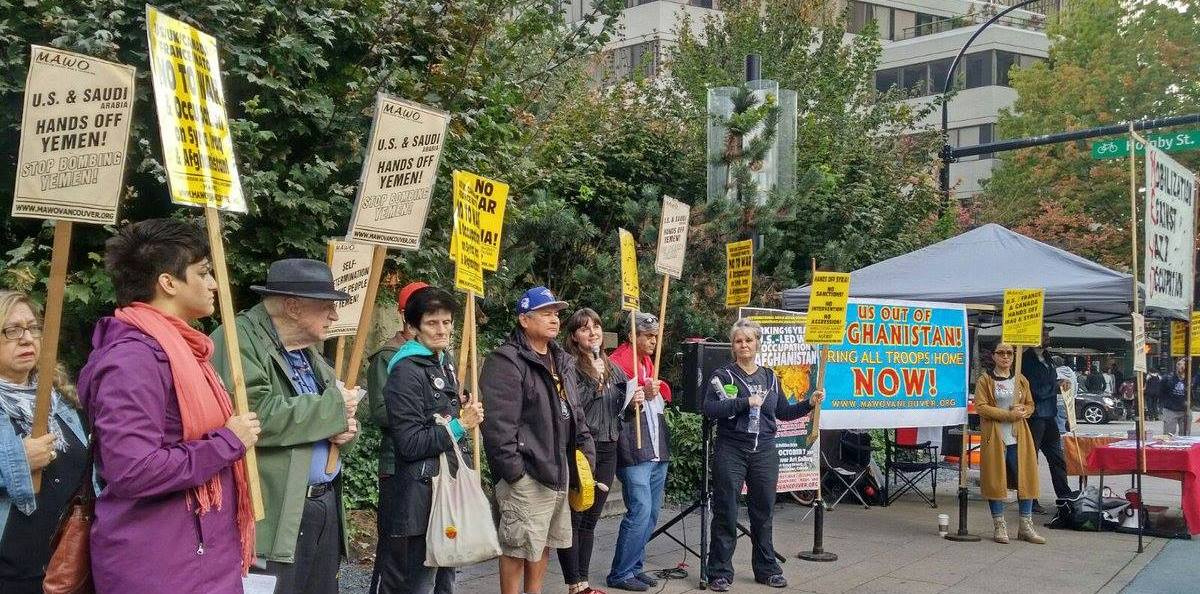
Anti-war picket in Vancouver, October 7, 2017, on occasion of 16th
anniversary of the U.S.-led
invasion of Afghanistan.
October 7 marked the 16th anniversary of the U.S.-NATO
invasion of Afghanistan. This illegal invasion and occupation was
spearheaded by the U.S. in the wake of the September 11, 2001
terrorist attacks in the U.S. Without providing any evidence, the
U.S. imperialists declared that certain forces in Afghanistan
were to blame. Using this pretext, the U.S. invoked the so-called
collective self-defence clause of the NATO Charter under the
banner of waging a "war on terrorism." The Obama presidency then
stepped up U.S. crimes under its "Pivot to Asia," with a massive
troop surge and a program of drone warfare that has been
expanded to Pakistan, on top of the destabilization, anarchy and
violence the NATO invasion unleashed. All told, more than 100,000
people have been killed in Afghanistan and the region since the
start of the NATO invasion.
In 2001, the then-Chrétien Liberal government
immediately embroiled Canada in combat operations, not only on
the basis of accepting the U.S. pretext for invasion, but also
doing its part to provide a phony humanitarian moral imperative
for its participation -- to justify war crimes on the basis of
"defence, diplomacy and development." In the case of
"development" all manner of high ideals about defending the
rights of Afghan women and girls were presented. Despite the
massive outpouring of anti-war sentiment from Canadians to end
the mission and bring Canadian troops home immediately,
subsequent Canadian governments, with the support of all the
so-called major parties in the Parliament maintained Canada's
role in the NATO occupation of Afghanistan. In 2011, the Canadian
government claimed that Canada's participation in combat
operations had ceased and it was said to only be involved in
"training." In 2014 it said that Canadian troops were
withdrawn.
With the election of Donald Trump as U.S. president in
2016
the unprecedented use of the Massive Ordnance Air Blast (the
"Mother of All Bombs") in Afghanistan on April 13, and the threats
issued to the people of the world in Trump's speech to the UN are
a clear message that Afghanistan is still an issue and that the
anti-war movement in Canada must continue to take a stand against
U.S. and NATO foreign intervention there.

Toronto protest April 16, 2017 against dropping of MOAB on Afghanistan.
In the first six months of 2017 alone, the UN
Assistance
Mission in Afghanistan reported a total of 1,662 dead civilians
between January 1 and June 30, including 174 women confirmed dead, and
462 injured, for a general increase of 23 per cent
compared to the same period of 2016. A total of 436 children lost
their lives, and 1,141 were injured.
 There are currently 13,459
NATO troops and 11,000 U.S.
troops
occupying Afghanistan. The U.S. is in the process of sending
3,000 more troops to bring its total to 14,000, for a grand total
of nearly 28,000 foreign troops. U.S. Defense Secretary James
Mattis and NATO Secretary General Jens Stoltenberg recently met
in Kabul to affirm NATO's commitment to the Afghanistan mission
and the U.S. is mobilizing with others to continue the NATO
occupation and foreign interference there. There are currently 13,459
NATO troops and 11,000 U.S.
troops
occupying Afghanistan. The U.S. is in the process of sending
3,000 more troops to bring its total to 14,000, for a grand total
of nearly 28,000 foreign troops. U.S. Defense Secretary James
Mattis and NATO Secretary General Jens Stoltenberg recently met
in Kabul to affirm NATO's commitment to the Afghanistan mission
and the U.S. is mobilizing with others to continue the NATO
occupation and foreign interference there.
As for Canada, it has already acquiesced to U.S.
pressure to
bolster NATO with a new defence policy and billions more in
military spending. There is also the striving of the Trudeau
Liberals to have Canada assert itself internationally, to be put
in charge of a peacekeeping mission with the ultimate aim of
achieving a seat on the UN Security Council, where it can use
humanitarian values as a prop to appear to counter U.S.
imperialist aims, while in fact acting to shore up U.S.
imperialism. It is far from a given that Canadian troops will not
return to Afghanistan. Nor should people be fooled about any talk
of "training" versus "combat."
On the occasion of the 16th anniversary of the war on
Afghanistan, the Communist Party of Canada (Marxist-Leninist)
calls on Canadians to reaffirm their longstanding opposition to
this war and all imperialist aggressions, regime changes and
occupations. Stand with the people of Afghanistan! Make Canada a
zone for peace!
NATO Out of Afghanistan! Canada Out of
NATO!

All U.S. Troops Home Now
- Voice of Revolution -
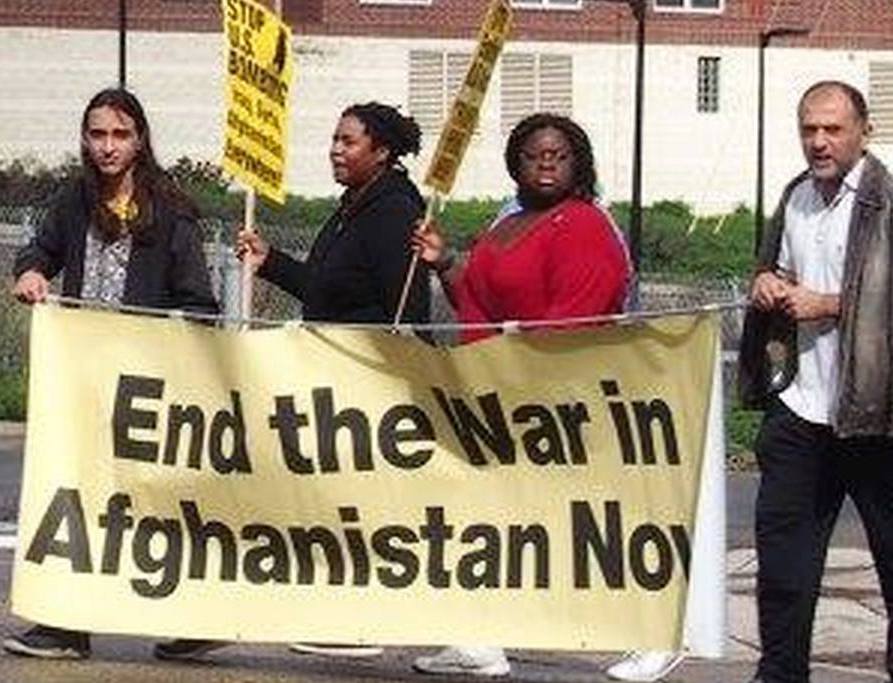 
October 6 marks the 16th anniversary of the U.S.
invasion
of Afghanistan, a criminal war of aggression that has
devastated the country and killed untold numbers of children,
women and men.
Demonstrations against the
war are taking place in
major
cities and at many universities on national days of action
October 6-8. Demands to end all U.S. wars, including those against
Yemen, Iraq and Syria, and to reject war against Korea are being
raised. A main call is: All U.S. Troops Home Now! It is bringing
troops home, not increasing their number, that contributes to
peace and security. It is up to the people of Afghanistan to
decide their government and future, not the U.S. The continued
war increases violence, anarchy and insecurity, as the past 16
years have shown. It has solved no problem, as what is needed is
a political resolution, not a military one. The U.S. resorts to
war and violence as it refuses to modernize democracy and must
block the peoples from decision-making power, whether at home or
abroad.
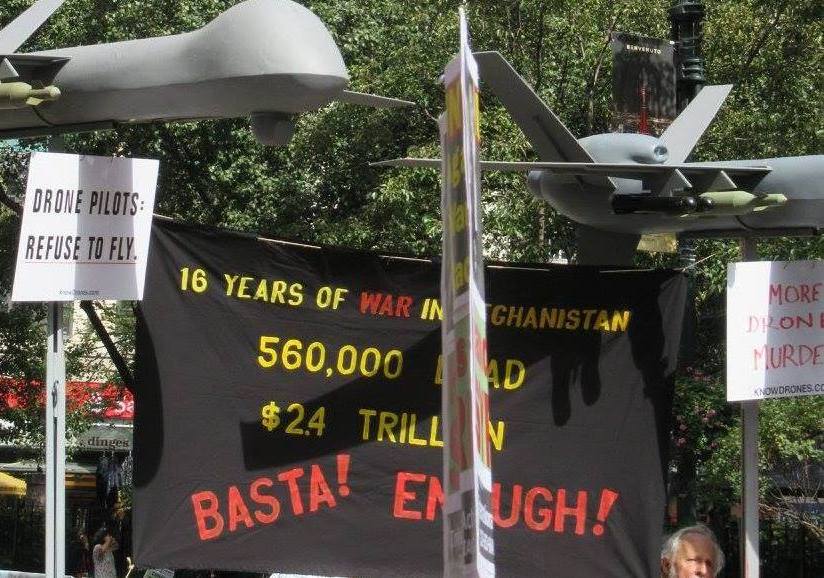 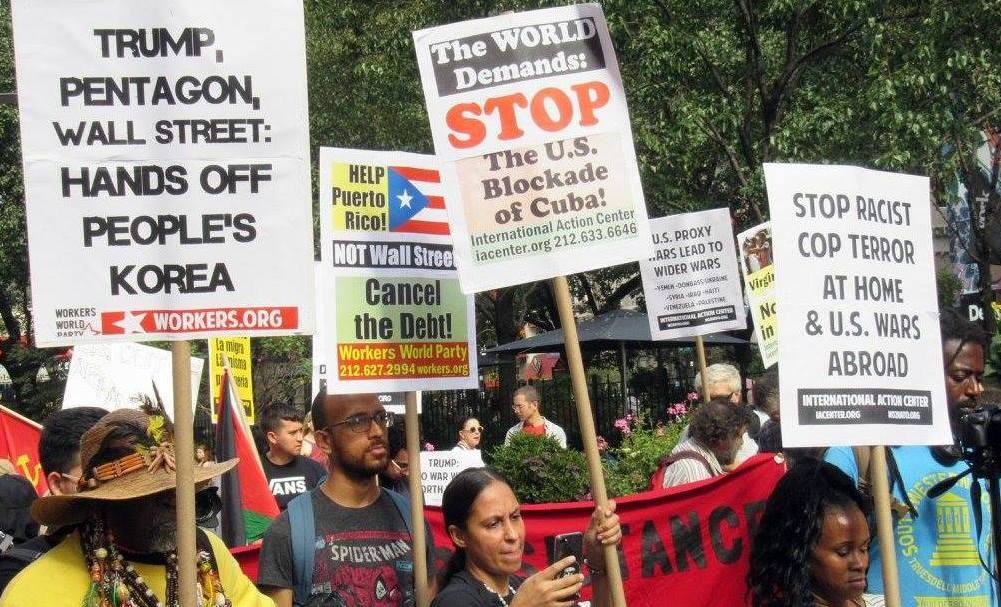
New York City, October 7, 2017
A main aim in demonstrating is to give public
expression to
the anti-war stand of the majority. It is a means to reject the
massive funding for the Pentagon now being debated in Congress,
with an additional $80 billion planned, for a yearly budget of
$700 billion. It is a means to stand up for principle, which is
that wars of aggression are crimes to be punished and U.S.
occupation of Afghanistan must end now. It is also a means to
unite in action, bringing together the many groups and forces.
Taking united action is the means by which to build working
relations and strengthen the unity and organized character of
resistance.
Strengthening the anti-war movement through mobilizing
public
support and working together in action is especially important as
the U.S. increases it plans for more war. Voice of Revolution
urges students, teachers and all concerned to join in taking a
stand: U.S. Out of Afghanistan Now! All U.S. Troops Home Now!
Many are also denouncing U.S. threats of war against the
Democratic People's Republic of Korea (DPRK).
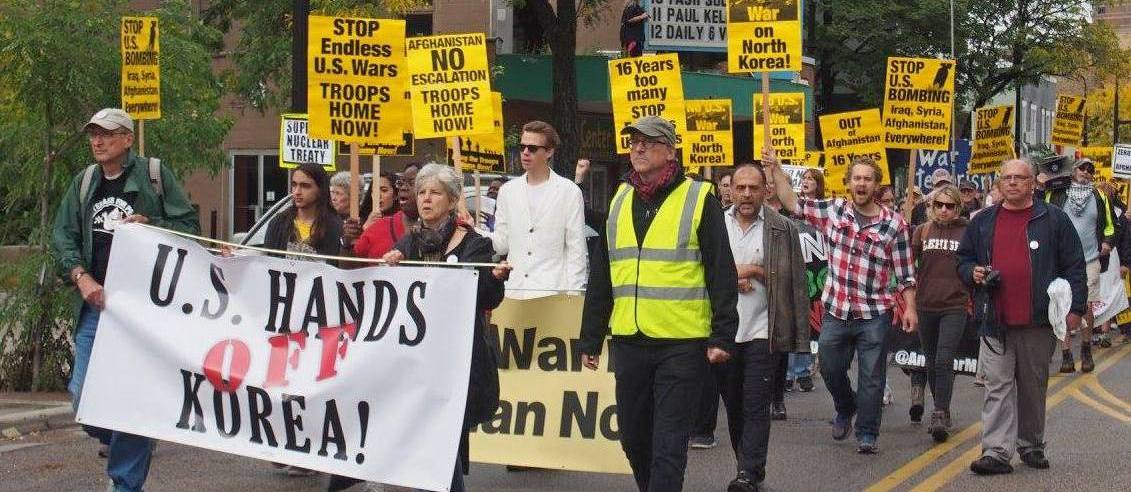
St. Paul's, October 7, 2017
Diplomacy, including signing a peace treaty and
accepting the
Koreans' proposal of a freeze for a freeze, with Koreans freezing
nuclear development and the U.S. freezing its massive war
games, is the way forward.
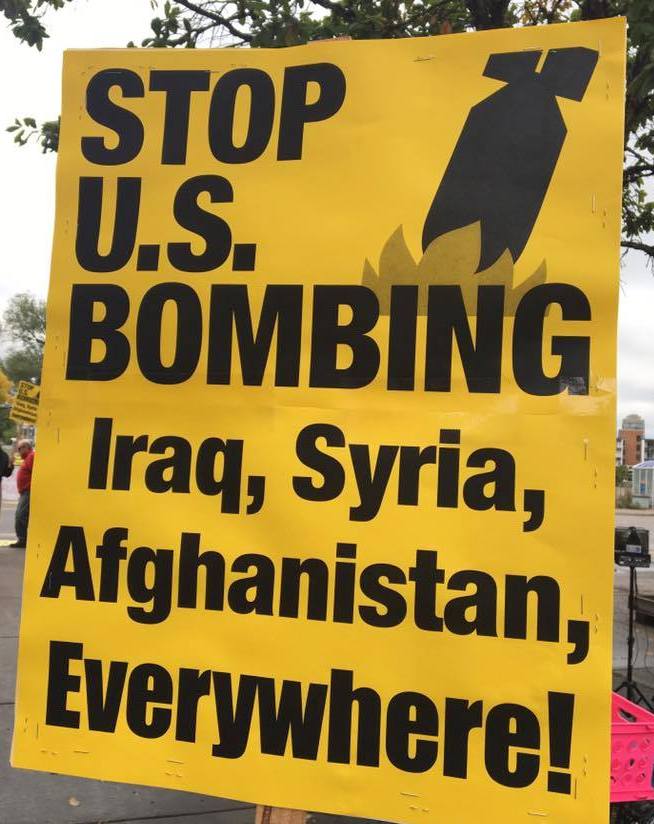 In his speech at the United
Nations, Trump indicated
the U.S.
is preparing for more war. He specifically threatened the
Democratic People's Republic of Korea saying, if the U.S. is
"forced to defend itself or its allies, we will have no choice
but to totally destroy North Korea." He then threatened the
entire world, claiming, "From now on, our security interests will
dictate the length and scope of military operation, not arbitrary
benchmarks and timetables set up by politicians. I have also
totally changed the rules of engagement in our fight against the
Taliban and other terrorist groups." This means the U.S. will
expand its attacks and justify use of drones and Special Forces
anywhere, anytime, in the name of fighting "terrorist groups."
Sovereignty is not the right of each country to determine its own
affairs, but the "right" of the U.S. to dictate and decide the
government in each country. In his speech at the United
Nations, Trump indicated
the U.S.
is preparing for more war. He specifically threatened the
Democratic People's Republic of Korea saying, if the U.S. is
"forced to defend itself or its allies, we will have no choice
but to totally destroy North Korea." He then threatened the
entire world, claiming, "From now on, our security interests will
dictate the length and scope of military operation, not arbitrary
benchmarks and timetables set up by politicians. I have also
totally changed the rules of engagement in our fight against the
Taliban and other terrorist groups." This means the U.S. will
expand its attacks and justify use of drones and Special Forces
anywhere, anytime, in the name of fighting "terrorist groups."
Sovereignty is not the right of each country to determine its own
affairs, but the "right" of the U.S. to dictate and decide the
government in each country.
It is clear that the U.S. is planning and preparing
more war,
itself a crime. This brings the need to discuss and organize for
an anti-war government to the fore. Organizing for an anti-war
government is a unifying aim and one that directly contributes to
the demand of the peoples here and worldwide for peace. It is
necessary to make the U.S. a factor for peace. In demonstrating
together, let us also discuss the need for an anti-war
government.
U.S. Out of Afghanistan Now!
All U.S. Troops Home
Now!
No War Against Korea!
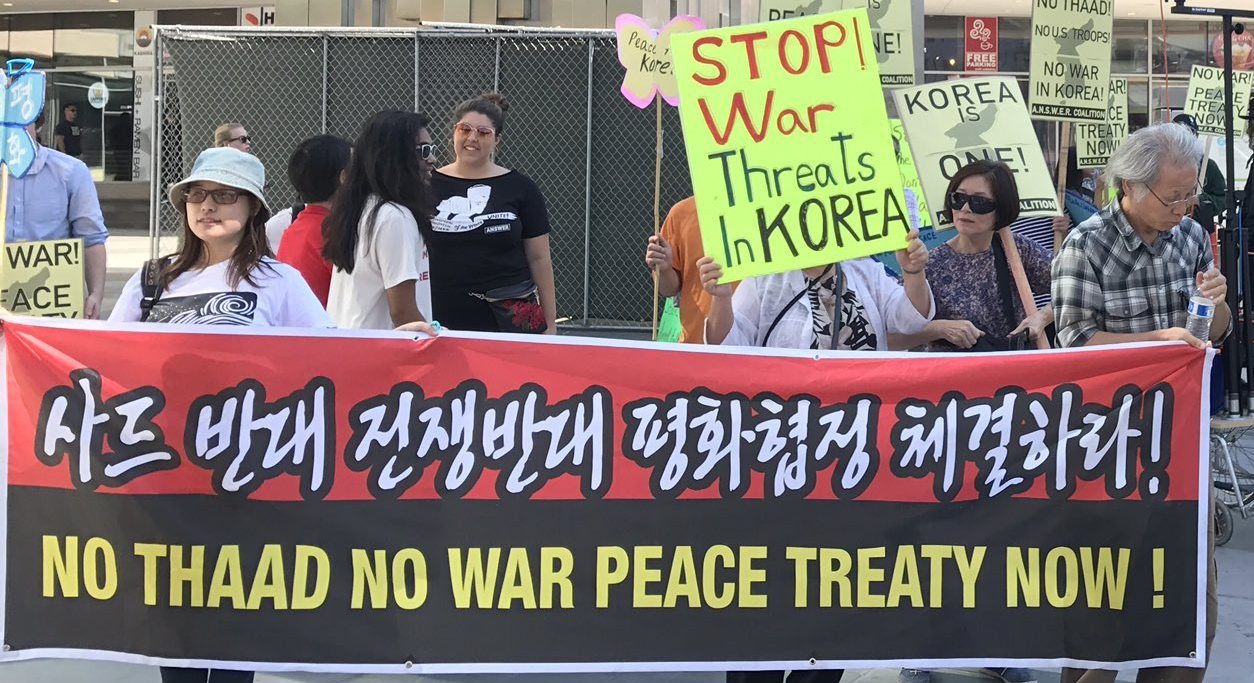
Los Angeles, anti-war protest October 7, 2017.

U.S. Senate Passes 2018 Defense Authorization Bill
The U.S. Senate passed a defense authorization bill on
Sept.
18 demanding the administration increase its extended deterrence
and security capabilities in the Asia-Pacific region. The bill,
which applies to the 2018 accounting year, was approved by a vote
of 89 to 8.
The defense authorization bill that passed the Senate
stipulates that the Secretary of Defense must submit plans within
30 days of its enactment for improvement of U.S. extended
deterrence and security capabilities in the Asia-Pacific region.
The bill indicates that the plan should include increased weapons
sales to allies in the region and expanded military cooperation,
exercises, and integrated defense with allies.
 The bill further requests a
plan for deployment of and
training with strategic weaponry, including dual-capable
strategic aircraft that can carry both conventional and nuclear
weapons, and increased Asia-Pacific defense capabilities and
visible presence of key U.S. military assets, including medium- to
long-range strike assets. The bill further requests a
plan for deployment of and
training with strategic weaponry, including dual-capable
strategic aircraft that can carry both conventional and nuclear
weapons, and increased Asia-Pacific defense capabilities and
visible presence of key U.S. military assets, including medium- to
long-range strike assets.
Additional content reaffirmed the U.S.'s commitment to
deployment of a THAAD antimissile system on the Korean Peninsula
and other defense of regional allies and to its existing extended
deterrent using all available defense capabilities to guarantee
security, including its nuclear umbrella. Not included in the
plan was the Asia-Pacific redeployment of submarine-launched
nuclear cruise missiles, a possibility that was raised at one
point.
The bill also omitted specific demands related to North
Korea
sanctions. The changes were seen as reflecting the mood in the
Senate -- which unlike the House of Representatives sees current
legislation for North Korea sanctions as sufficient.
The defense authorization bill previously passed the
House in
July and has undergone fine-tuning between the two houses of
Congress. But the two bills' inclusion of roughly similar content
in terms of the Asia-Pacific region and provisions for increased
military pressure against both North Korea and China suggests
some potential for increased regional tensions.

Puerto Rico
Militarization of Hurricane Relief
- Voice of Revolution -
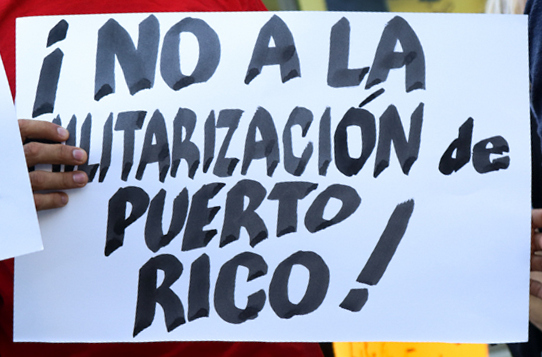 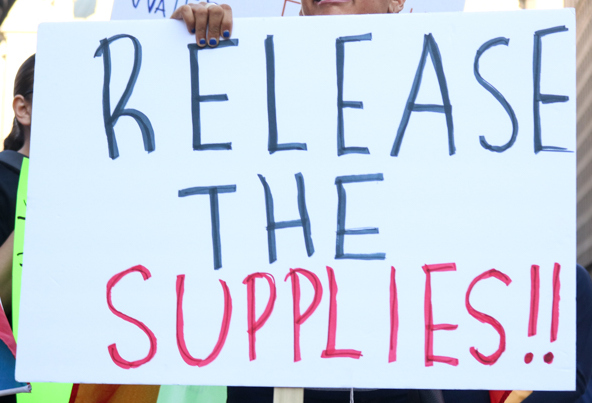
Signs at emergency rally for Puerto Rico, Philadelphia, September 29,
2017.
New York City and Buffalo's Puerto Rican community,
alongside that of Boston and Chicago, and joined by all those
concerned across the country, have rallied support for the
millions contending with no power, no drinking water and the
broad devastation across Puerto Rico. It is the people in the
U.S. and Puerto Rico who are setting up facebook pages to provide
information about conditions in various towns, reach out to
family in Puerto Rico where lack of power means communication is
down, set-up fund raising campaigns, and organizing together for
the recovery.
Following on the heels of Irma, which caused $1 billion
in
damages to homes and buildings, Hurricane María, with 155
mile-per hour winds -- alongside government failure to provide the
infrastructure and safety required before, during and after such
storms, -- has created a major humanitarian crisis in Puerto Rico.
Much of the island remains without communications. Entire towns
are isolated. Tens of thousands were forced to flee massive
flooding, as the Guajataca Dam failed. It was known that this was
going to occur, yet little was done in advance to prevent it. The
90-year-old dam, much like the levees in New Orleans with Katrina
in 2005, was not strengthened and upgraded as required.
The National Weather Service warned the failure of the
dam
might be "imminent" and could lead to "life-threatening" flash
floods for the estimated 70,000 people living in the immediate
area. "This is an extremely dangerous situation," the NWS wrote.
"All the areas around the Guajataca River must evacuate now. Your
lives are in danger." The next day rushing water was sweeping
through the municipalities of Isabela and Quebradillas after the
dam failed.
The dam failure could have been prevented and is thus a
government-made disaster. Similarly, while the government
routinely calls for evacuations, as it did in Houston and Miami,
it has no plan to guarantee such evacuations. Families are left
to fend for themselves. And if they cannot afford to leave or
have no means to do so, they cannot evacuate.
Puerto Rico, crippled by U.S. colonialism, and
specifically
the Control Board imposed, which has massively cut funding for
social programs and infrastructure, was especially vulnerable. It
is also now without funds for rebuilding and still under the
dictate of the Control Board, which requires that debt payments
come first. Current conditions overall are also government made,
in that funding for infrastructure was not sufficient. While
Trump finally declared Puerto Rico a disaster area, which
releases federal funding, providing the immediate resources now
is also not occurring at the level required. In fact the Federal
Emergency Management Agency (FEMA) is standing in the way of aid
and creating a situation where supplies that have arrived are not
being delivered.
The same can be said of reconstruction efforts in
Houston and
south Florida. So while an additional $80 billion is being
provided to the Pentagon, making a yearly budget of about $700
billion, funding for relief and reconstruction is far below that.
This too is a government-made disaster. Full and immediate
funding is required.
In addition, the U.S. is blocking efforts by Cuba and
Venezuela to provide assistance. President Nicolás Maduro of
Venezuela promised to activate a "special plan of support and
solidarity" for Puerto Rico. Cuban Foreign Minister Rogelio
Sierra offered to send a team of 39 doctors "to help our brother
people." The U.S. is refusing to allow the doctors to come to
Puerto Rico, again showing its colonial status, as the people of
Puerto Rico welcome the support.
Disaster Relief as Military Exercise
There is also great concern about the military's role
in
emergency operations in Texas, Florida and now Puerto Rico. For
many, the military presence is more like an occupation than
assistance. Soldiers armed with automatic weapons man
checkpoints, something which civilians could easily do.
Every branch of the armed services -- the Army, Navy,
Air
Force, Marine Corps, and Coast Guard -- deployed significant
contingents to the Houston area, in some cases sending along the
sort of specialized equipment normally used in major combat
operations. The combined response represented an extraordinary
commitment of military assets to that massively flooded region:
tens of thousands of National Guard and active-duty troops,
thousands of Humvees and other military vehicles, hundreds of
helicopters, dozens of cargo planes, and an assortment of naval
vessels. And just as operations in Texas began to wind down, the
Pentagon commenced a similarly vast mobilization for Hurricane
Irma and then Maria.
Despite this massive military mobilization, ensuring
power
and clean water for the people impacted by the hurricanes was
commonly not the main aim. The military is capable of quickly
establishing power, water and food to run a small city. It could
readily do so in the many towns left isolated in Puerto Rico. It
has not done so. Rather, checkpoints were established and
impacted areas patrolled by armed guardsmen. When federal relief
comes in the form of armed National Guard troops patrolling the
storefronts of flooded streets, weapons trained on local
residents in the name of "the maintenance of civil order," it is
clear that an exercise in military occupation is taking place.
People are being treated as a threat, rather than as human beings
with rights to water and shelter.
The military's response to Hurricane Harvey began with
front-line
troops: the National Guard, the U.S. Coast Guard, and units of
the U.S. Northern Command (NORTHCOM), the joint-service force
responsible for homeland defense. Texas Governor Greg Abbott
mobilized the entire Texas National Guard, about 10,000 strong,
and guard contingents were deployed from other states as well.
The Texas Guard came equipped with its own complement of
helicopters, Humvees, and other all-terrain vehicles; the Coast
Guard supplied 46 helicopters and dozens of shallow-water
vessels, while NORTHCOM provided 87 helicopters, four C-130
Hercules cargo aircraft, and 100 high-water vehicles.
Still more aircraft were provided by the Air Force,
including
seven C-17 cargo planes and, in a highly unusual move, an E-3A
Sentry airborne warning and control system, or AWACS. This
super-sophisticated aircraft was originally designed to oversee
air combat operations in Europe in the event of an all-out war
with the Soviet Union. Instead, this particular AWACS conducted
air traffic control and surveillance around Houston, gathering
data on flooded areas, and providing "situational awareness" to
military units involved in "restoring order."
For its part, the Navy deployed two major surface
vessels,
the USS Kearsarge, an
amphibious assault ship, and the USS
Oak
Hill, a dock landing ship. "These ships," the Navy reported,
"are
capable of providing medical support, maritime civil affairs,
maritime security, expeditionary logistic support, [and] medium
and heavy lift air support." Accompanying them were several
hundred Marines from the 26th Marine Expeditionary Unit based at
Camp Lejeune, North Carolina, along with their amphibious assault
vehicles and a dozen or so helicopters and MV-22 Osprey
tilt-rotor aircraft.
When Hurricane Irma struck, the Pentagon ordered a
similar mobilization
of troops and equipment. The Kearsarge
and the Oak Hill,
with
their
embarked
Marines
and
helicopters,
were
redirected
from
Houston
to
waters
off
Puerto
Rico and the Virgin Islands. At the
same time, the Navy dispatched a much larger flotilla, including
the USS Abraham Lincoln (the
aircraft carrier on which President
George W. Bush had his infamous "mission accomplished" moment),
the missile destroyer USS Farragut,
the
amphibious
assault
ship
USS
Iwo Jima, and the
amphibious transport dock USS New
York.
Instead of its usual complement of fighter jets, the Abraham
Lincoln set sail from its base in Norfolk, Virginia, with
heavy-lift helicopters; the Iwo Jima
and New York also carried a
range of helicopters for relief and control operations.
The military presence for "civil control" and
protection of
property has brought to mind the military occupation of New
Orleans following Hurricane Katrina. Concentration camps were put in
place
for residents, families were separated and forced to evacuate,
armed troops were used to protect private property while families
were left stranded on their roofs. Brigadier General Gary Jones,
the commander of the Louisiana National Guard's Joint Task Force
notably stated, "This place is going to look like Little Somalia.
We're going to go out and take this city back. This will be a
combat operation to get this city under control." With orders
from their commanding officers to confront looters and shoot to
kill, soldiers and local police alike targeted the residents of
New Orleans, especially the mainly African American areas. Many
in Puerto Rico, already a U.S. colony, are concerned that the
increased military presence will remain.
The long-term recovery needed in Puerto Rico and all
the
areas hit by the hurricanes likely mean a continued military
presence. Instead what is needed is full funding now for the
needs of the people and providing them with the resources and
power to decide how best to utilize the funds. It is defending
the rights of the people that is required, not the property of
the few. Further, for Puerto Rico, an immediate assistance would
be to Cancel the Debt! And make the Wall Street financiers that
imposed it and benefit from it, pay for recovery.
Emergency Rallies for Puerto Rico
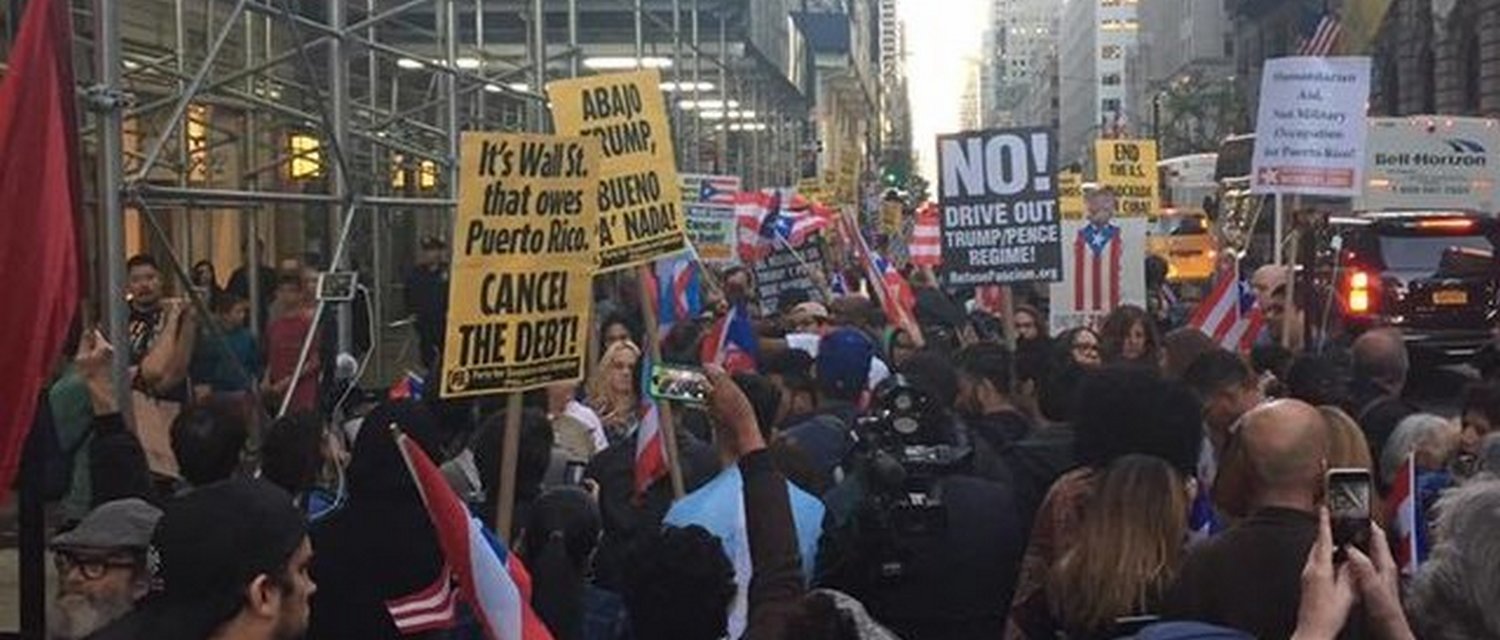
New York City, September 28, 2017

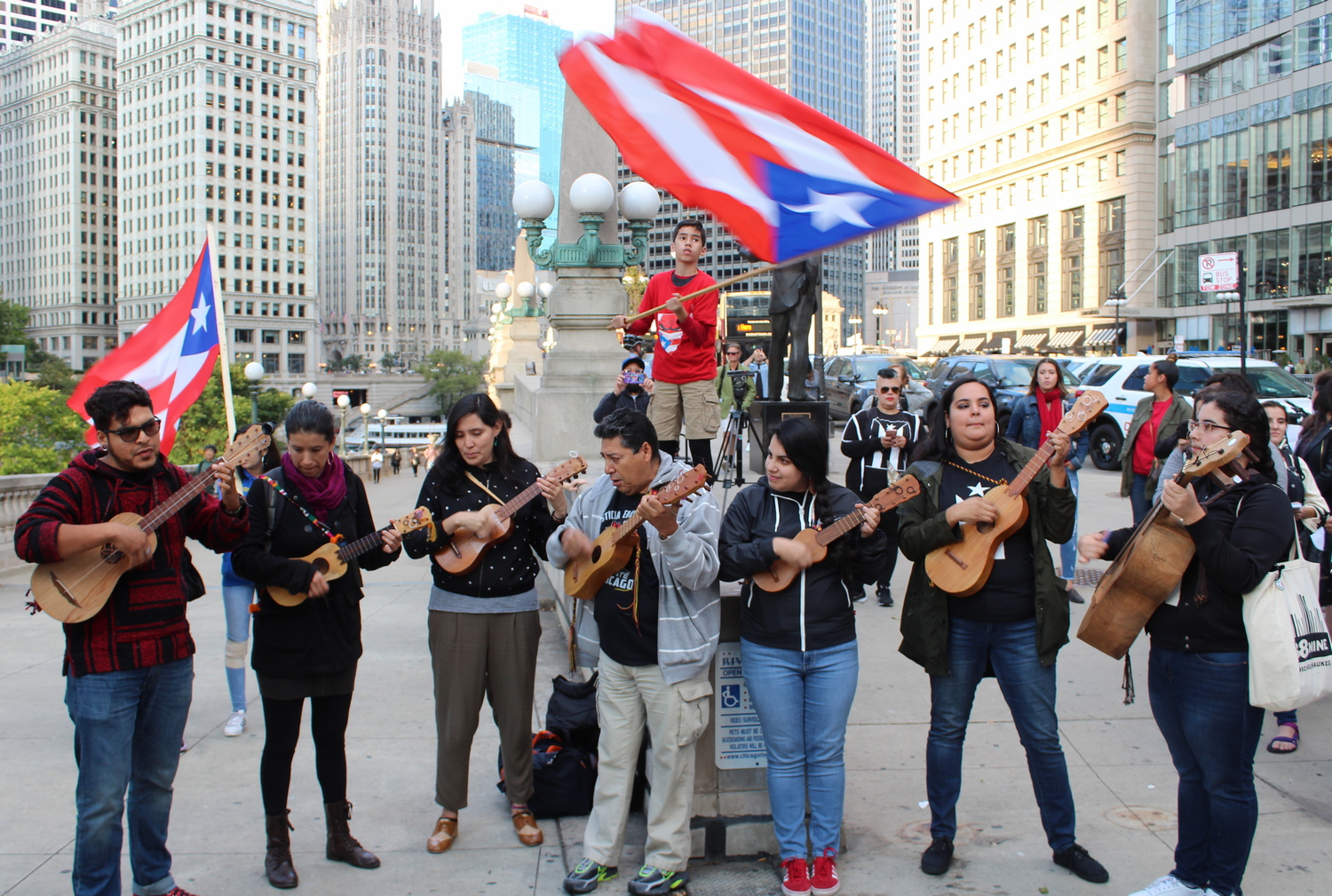
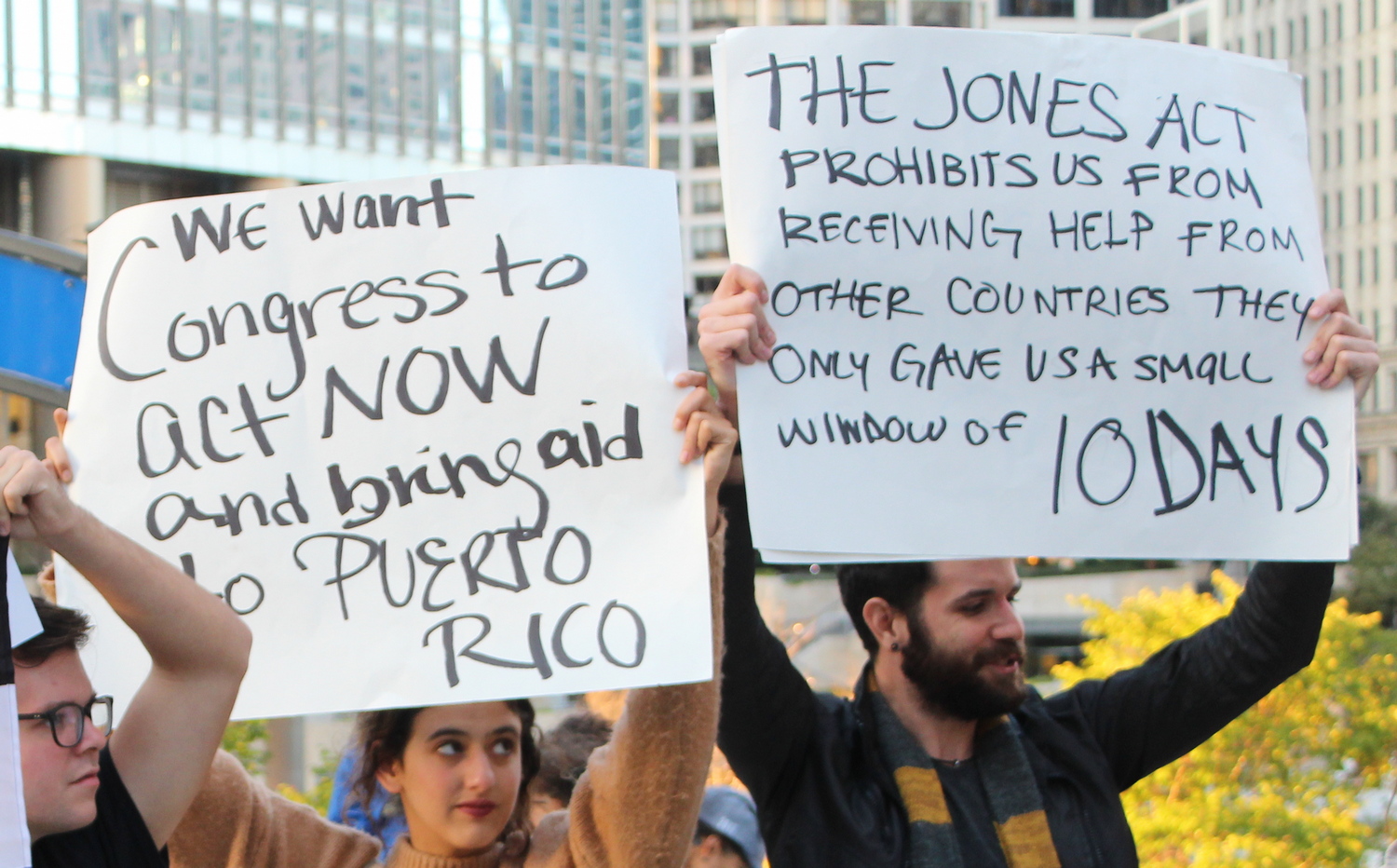 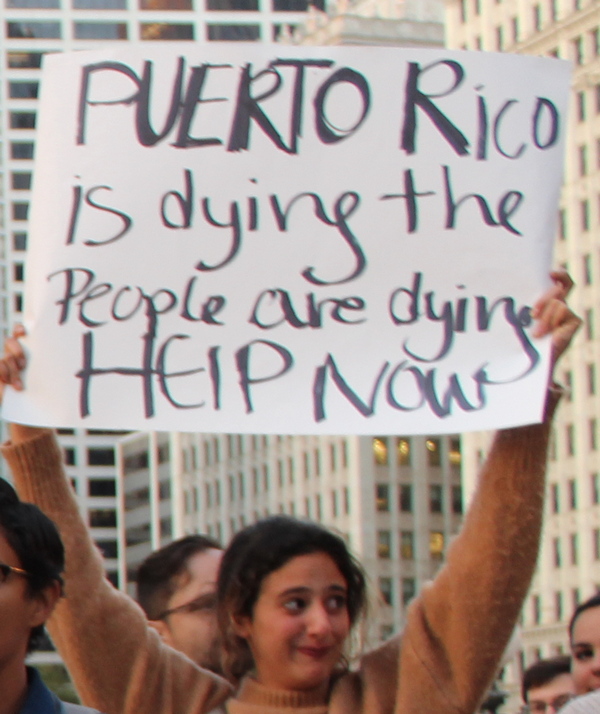
Chicago, September 30, 2017
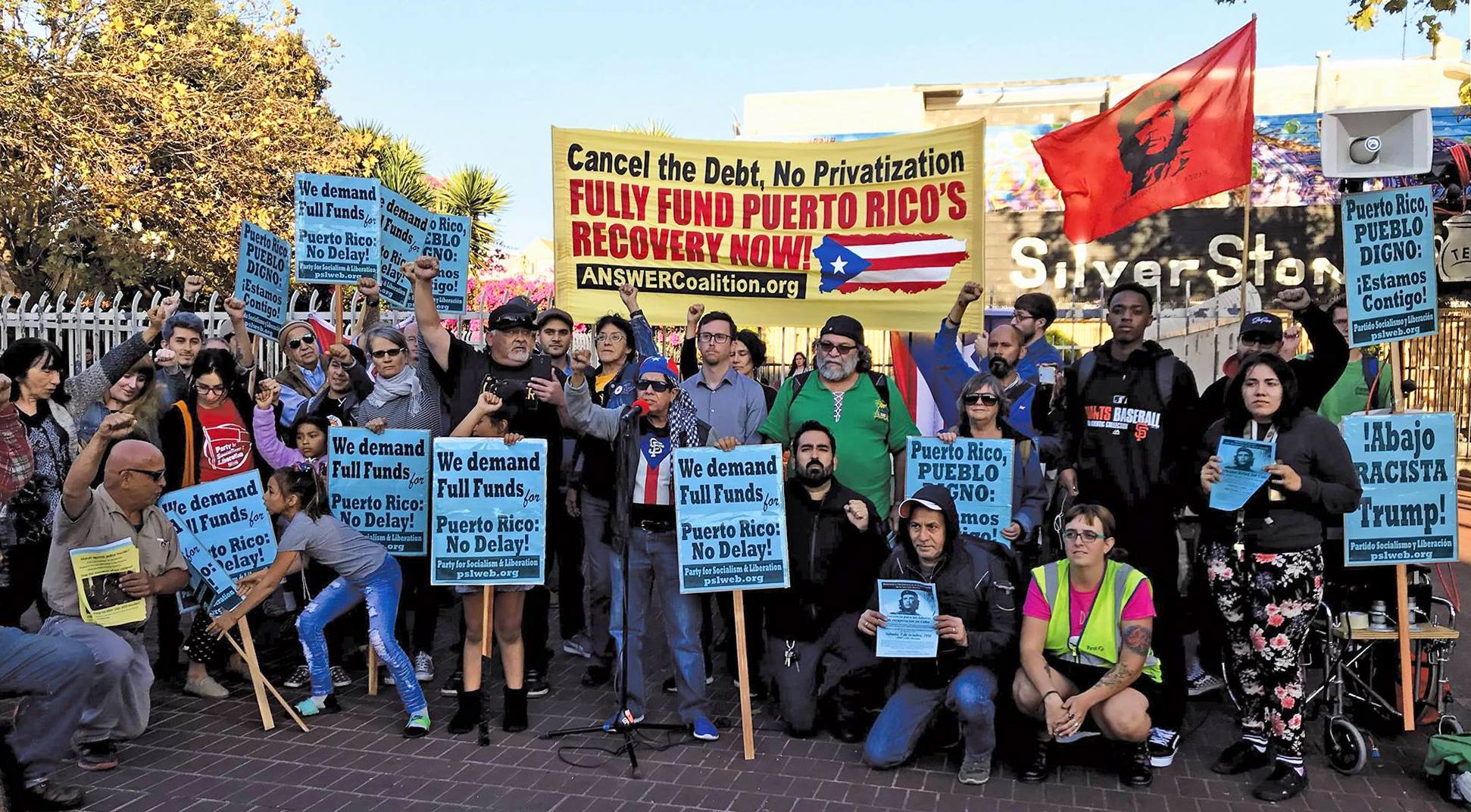
San Francisco, October 3, 2017

Los Angeles
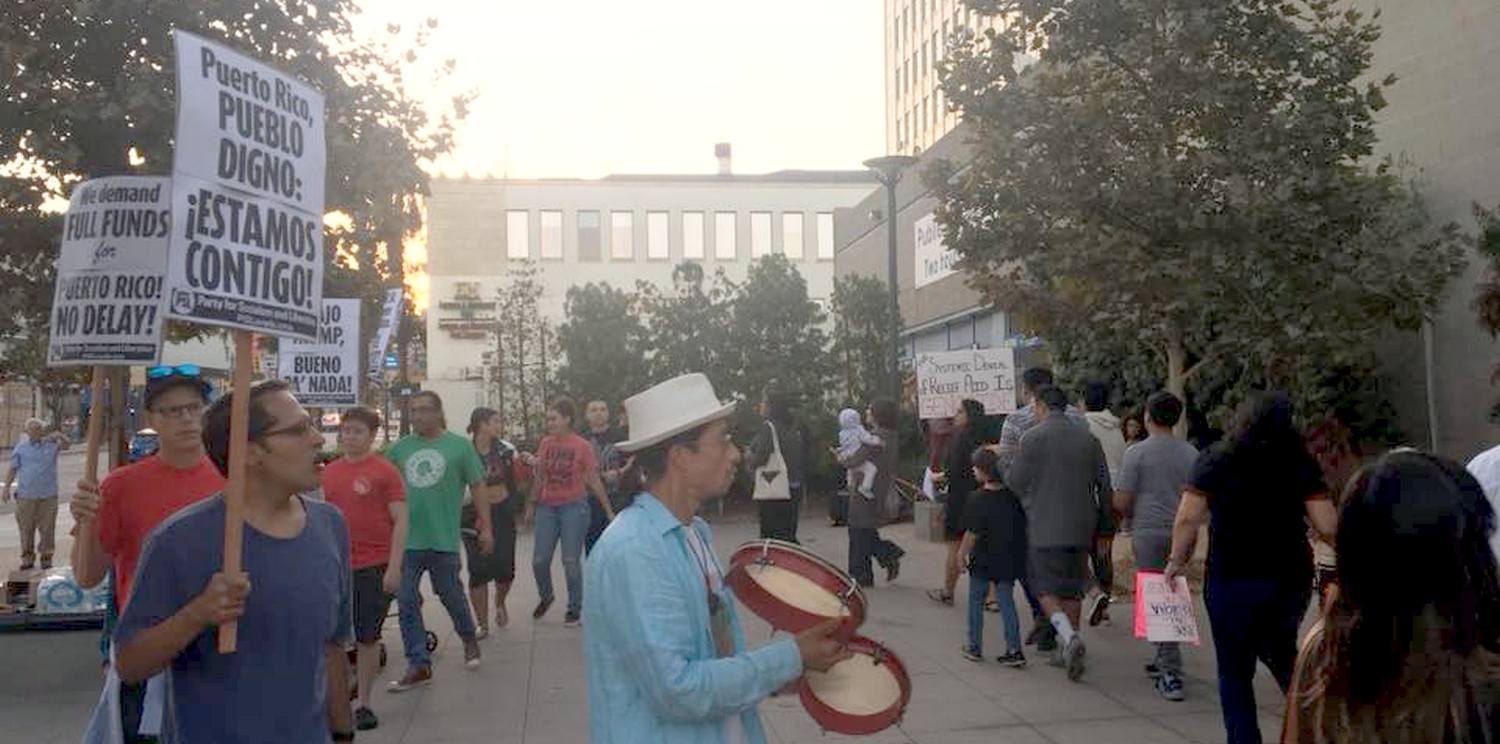
Long Beach

The United States Has a Responsibility
It Has Not Been
Fulfilling
- Digna Sánchez Jiménez -
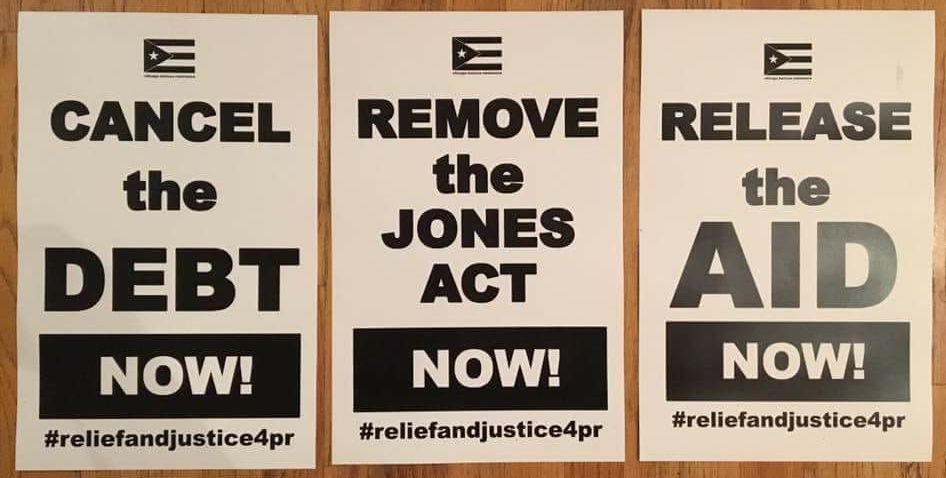
Presentation to the
Coordinating Bureau of the Movement
of
Non-Aligned Countries (NAM) by Digna Sánchez Jiménez,
member of the Executive Committee, National Hostos Movement for
the Independence of Puerto Rico, September 29, 2017, United
Nations.
***
Dear Members of the Coordinating Bureau of the NAM,
My name is Digna Sánchez Jiménez. I am a
member
of the Executive Committee of the National Hostos Movement for
the Independence of Puerto Rico (MINH). We are grateful for this
opportunity to bring here the voice of my people who are going
through a catastrophic crisis brought on not just by Hurricane
María or Hurricane Irma the week before.
When the United States invaded Puerto Rico in 1898 with
the
excuse of the Spanish American War, it initiated the history of
United States colonial domination of Puerto Rico. Since that
ominous beginning, our country has been used for the plans of
savage capitalism which has sought only to benefit the
capitalists in the metropolis. We have thus been used for diverse
plans which have destroyed our agriculture to the point where we
now import 85 per cent of what we consume thus making our food
supply greatly precarious, especially since we are an island.
|

"Fiscal control board, colonial slavery"
|
Meanwhile, regarding the economy, the United States
projects
the image that its federal government is benevolent towards us,
but in reality they extract billions of dollars from Puerto Rico.
The economic policy they have promoted in the colony has resulted
in a situation where our economy has been shrinking for more than
a decade. As a result, in 2016 they imposed a Fiscal Control
Board to ensure payment of the debt to Wall Street and the hedge
funds. They are not concerned about the future development of
Puerto Rico for the benefit of Puerto Ricans. The three branches
of the United States government finally recognized in 2016 that
Puerto Rico "belongs to, but is not a part of" the United States.
It is a colony, and despite the lies, even they have recognized
that.
The Fiscal Control Board has refused to audit the $70
billion
debt. Their only purpose is payment of the bonds, many of
them now in the hands of hedge funds. But much of this debt
did not comply with legal requisites. Nonetheless, to ensure its
payment, the Fiscal Control Board has imposed austerity measures
that are drowning the already small local economy. The people
have been struggling against this Board, but the situation has
become extremely difficult and one of the results has been the
massive migration of Puerto Ricans mainly to the United States
where there are now more Puerto Ricans than in Puerto Rico!
Now we have been hit by Hurricanes María and
Irma. The
devastation is unbelievable. Our beautiful archipelago is wounded
and our people are suffering. The United States has a
responsibility it has not been fulfilling, and President Trump
had the audacity to say that Puerto Rico is devastated, but it
has to pay the debt. It was not until yesterday that Puerto Rico
was temporarily exempted, for ten days, from United States
maritime laws, imposed on Puerto Rico through the Jones Act,
which mandate since 1917 that only ships built in the United
States and manned by United States crews may carry cargo into and
out of Puerto Rico. These laws must be struck down permanently.
In the face of Puerto Rico's present humanitarian
crisis we should be able to receive aid from other countries and
to engage in commerce with other countries without having to use
the United States merchant fleet which is the most expensive in
the world.
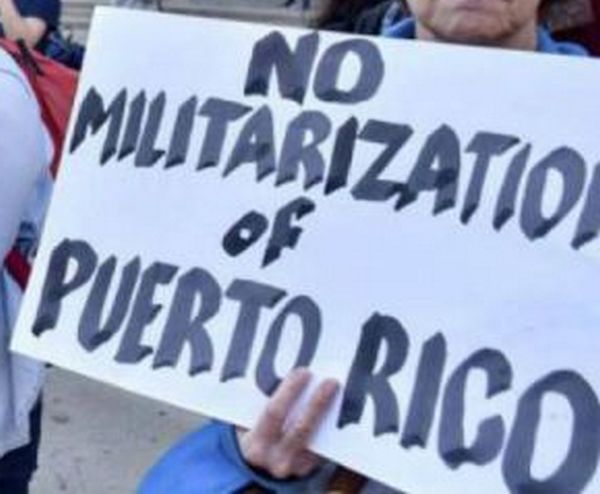 Criticism to the United
States due to its slow pace in
responding to its responsibility to aid has been answered with
the statement that it was a problem of the Puerto Ricans. They
have now assigned a general to coordinate the aid. We are greatly
concerned about the militarization of Puerto Rico. Pro
independence forces have historically been persecuted and this
terror was part of the script that the armed forces used in
Puerto Rico. Criticism to the United
States due to its slow pace in
responding to its responsibility to aid has been answered with
the statement that it was a problem of the Puerto Ricans. They
have now assigned a general to coordinate the aid. We are greatly
concerned about the militarization of Puerto Rico. Pro
independence forces have historically been persecuted and this
terror was part of the script that the armed forces used in
Puerto Rico.
We ask that our friends help us. Solidarity is
powerful. When Hurricane Irma struck the smaller countries of the
Caribbean,
ships of people from Puerto Rico went to the aid of our neighbours
in the Caribbean before the U.S. and European governments brought
help. Puerto Rico, my people, will rise and we are counting on
your support.
Thank you.

Hurricanes Expose Destructive Force of
U.S. Colonialism
- Interview, José E. López -
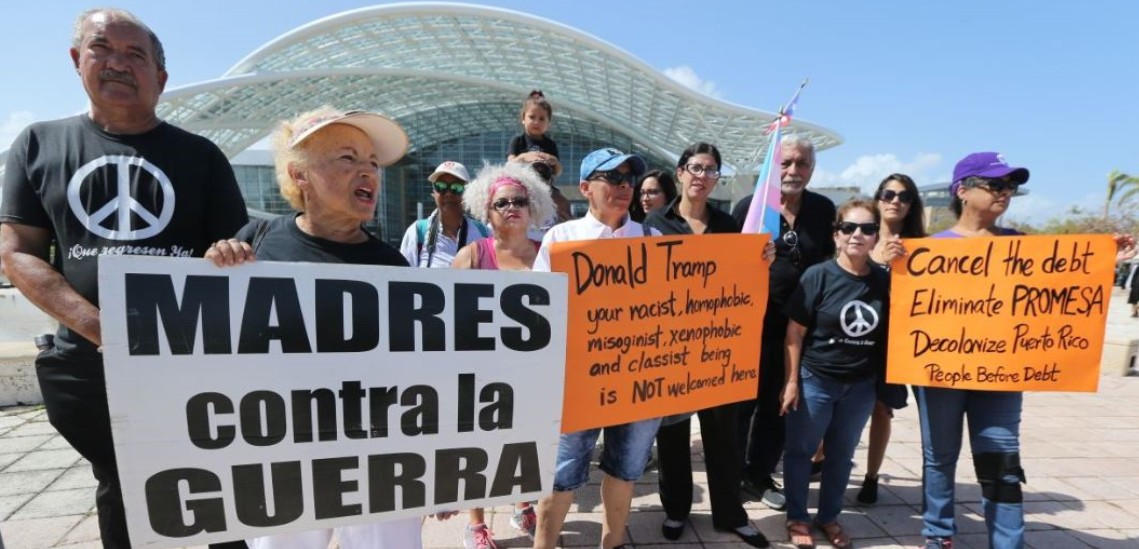
Protest against visit of U.S. President Donald Trump, San Juan, Puerto
Rico, October 3, 2017.
Excerpted below is an
October 12 interview with José E.
López of the Puerto Rican Cultural Center in Chicago,
conducted by Molly Osberg of Splinternews.com, regarding the
current situation in Puerto Rico and its colonial relationship to
the U.S. López is the brother of well-known Puerto Rican
independence fighter and former political prisoner Oscar
López Rivera, and also part of the Puerto Rican
independence movement.
***
Molly Osberg: What were some of the
major
issues for the [Puerto Rican independence] movement right before Maria
hit?
José E. López:
What
we --
and I mean the sort of radical sector of the Puerto Rican
community -- were doing in Puerto Rico was mostly a lot of work against
the oversight board, and against the imposition of the PROMESA
law [which restructured Puerto Rican debt during the Obama
administration].
 But as for the community in
the United States, we've
been
doing work for years around the connection between the colonial
situation of Puerto Ricans and the marginalization of Puerto
Ricans in the United States. So in particular I can speak to the
work that we've been doing in Chicago for the past 50 years,
creating a series of parallel institutions to serve the needs of
our community. But as for the community in
the United States, we've
been
doing work for years around the connection between the colonial
situation of Puerto Ricans and the marginalization of Puerto
Ricans in the United States. So in particular I can speak to the
work that we've been doing in Chicago for the past 50 years,
creating a series of parallel institutions to serve the needs of
our community.
That includes issues of housing, education, health,
employment -- all of the things that fall by the wayside when you
are not considered an integral part of the society and are not
allowed to fully partake as a full citizen.
And the hurricane as a natural phenomenon has unmasked
the
very unnatural causes of the situation in Puerto Rico.
Hurricane Maria and its impact on the island has to be
seen
against the prism of the U.S. colonial enterprise in Puerto Rico.
And what that has meant since 1898: Puerto Ricans have never been
able to self-actualize, nor self-determine. And right now as we
look at the contempt that President Trump holds for the Puerto
Rican people, it's really unmasking that colonial reality. It's
been a hidden struggle, and we're finally breaking through, and
people who might not know much are talking about Puerto Rico and
its unnatural relationship to the United States.
MO: What's the relationship between
the work
you do in Chicago and the broader Puerto Rican independence
struggle?
JEL: Most people understand, or at
least
have a concept, of what a direct colony is. Colonialism as a
system is pervasive all over the world: Most of the countries in
the world are in a neo-colonial relationship to the United
States. And then there are the internal colonies within the
dominant colonies. For example, if I look at the conditions of
Puerto Ricans in the South Bronx, the conditions of African
Americans in the Mississippi Delta, the conditions of Native
Americans that have lived in the occupied lands of New Mexico, so
many of them would have the same lack of housing, lack of
education, lack of quality of life. There's something
systematically wrong with the U.S. in terms of its relationship
to these people. Its not just a question of class, or of the
relationship to people of color. For these populations it's a
colonial question, as well.
MO: And what are you thinking about
how
recent events are going to shape this colonial relationship?
JEL: It's pretty clear one
of the
most important aspects of this moment, particularly for
progressive people in this country, is realizing that Puerto Rico
is a direct U.S. colony. And that in many ways much of the
progressive movement in this country has totally ignored the
question of Puerto Rico. It's time to really begin to analyze
that, to say, "We have been complicit in this colonial
enterprise, even on the left."
I think it's that people have a really difficult time,
even
progressive people, dealing with the U.S. as an imperial power.
U.S. history is formulated against the backdrop of denial of a
culture of empire. We never study the movement and the killing of
Native Americans as a colonial enterprise. We don't see the U.S.
taking over Hawaii as an imperial design. We don't see the U.S.
taking over Alaska as an imperial design. So we don't see Puerto
Rico as an imperial design. So when we don't acknowledge that, we
also have a problem of trying to deal with it.
MO: Do you expect the U.S.
government's
disastrous response to the hurricane to reinvigorate, or change
aspects of, the independence movement?
JEL: In Puerto Rico there
has been
a long history of resistance against U.S. colonial rule. It began
the very moment the U.S. established control of Puerto Rico in
1898. We have a list that shows over 2,000 people, historically,
were incarcerated in Puerto Rico because of their activism in the
Puerto Rican independence moment, and in their struggle for
social justice. And if we add, for example, the incarceration
rate in 1950, when Puerto Rico rose up against colonial rule in
an armed uprising, we could make the list even longer.
But there is a long history of political incarceration,
a
long history of political persecution, that has been waged by the
U.S. government, particularly through the FBI and its COINTEL
program, that has been around since the late '50s. But as a
matter of fact, last year we were able to free my brother, who
was the last political prisoner. He was in prison for 36 years of
his life, for his activism, for his advocacy, for his work around
Puerto Rican independence.
But I think the movement is already reinvigorated. The
Puerto
Rican people, many of them who were blind to the colonial
reality, are awakening to the fact that the only thing they can
count on right now in Puerto Rico are the efforts of the Puerto
Rican people themselves.
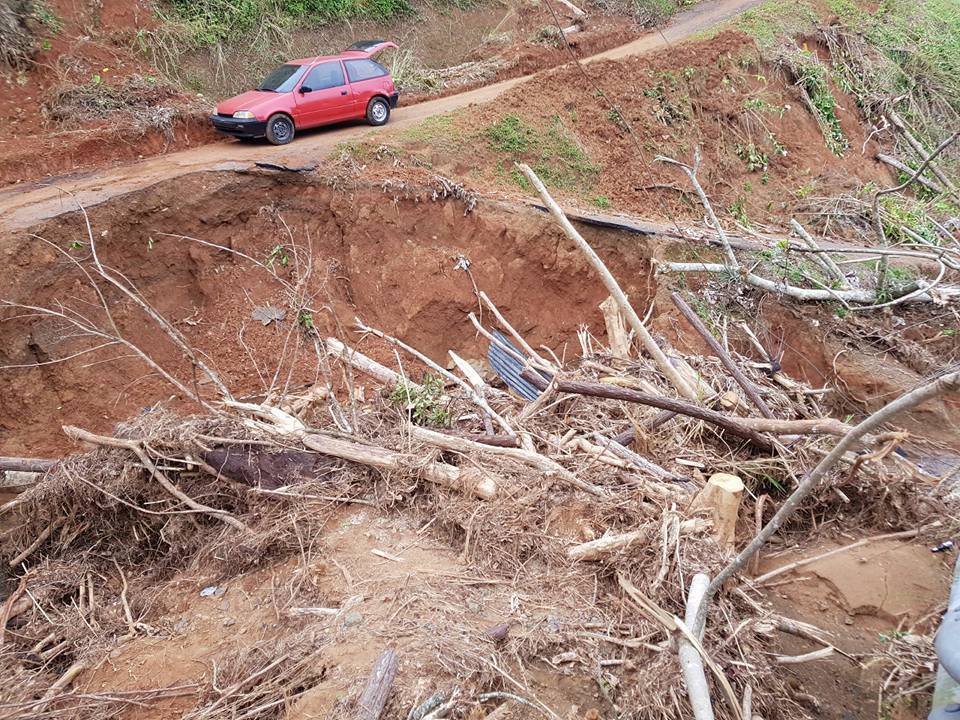 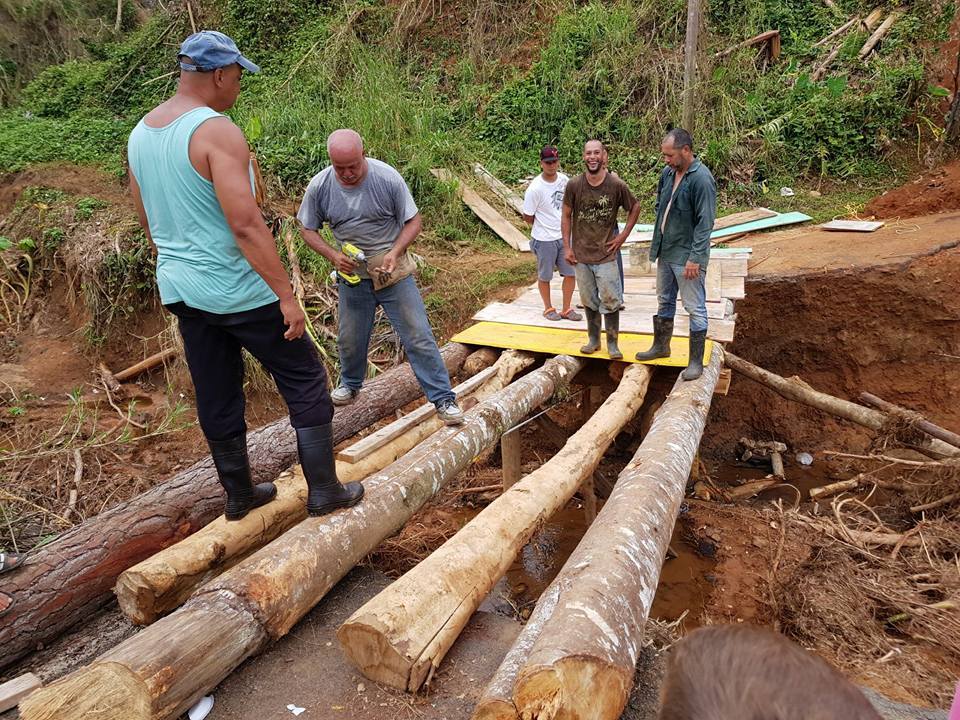
 
In the absence of assistance from government authorities, Puerto Ricans
rely on each other and
show their resilience and resourcefulness.
President Trump talks as if FEMA [Federal Emergency
Management Agency, of the U.S. Department of Homeland Security] was
there, and had
done this
great job. But how can you say that on an island that was just
devastated, where people are very ill, where people were ill
before the hurricane, where so few people have been helped?
I mean, right now you have a bunch of supplies in the
port of
San Juan that have not been delivered to people. There's nothing
in place. Because in Florida and in Texas, FEMA and the
government already had a plan of how you were going to deal with
this catastrophe. Here there was no planning.
MO: What do you think needs to be
done,
policy-wise?
JEL: You have to eliminate
the
debt. That's the first thing that we must demand. Because this
debt can never be repaid, this debt was never incurred by the
Puerto Rican people, this debt has never been audited. We don't
really know how much is owed, and this debt will only fill the
coffers of the hedge funds and the bankers. It will do nothing
for Puerto Rico.
I think we gotta figure out the Jones Act, which limits
any
shipping to and from Puerto Rico. Puerto Rico should be able to
receive ships and food and supplies from any part of the world.
Right now it means that Puerto Ricans are paying at least 15 to
20 percent more on any good that's shipped to Puerto Rico. And
the other thing is: We must undo this oversight board. And in
addition to that there should be a process that guarantees Puerto
Rico equity in terms of Medicare and Medicaid.
MO: And what do you expect to see in
this
movement, going forward?
JEL: In all the Puerto
Rican
communities there has been a lot of organizing effort, and it
must lead to something that is long-term, that has a commitment
to rebuilding Puerto Rico, to rebuilding the kind of
infrastructure that guarantees a process that will continue to
ultimately invest in a future Puerto Rico.
I think [San Juan Mayor] Carmen Yulín Cruz is
probably the only
effective voice in Puerto Rico today -- she has become a
symbol, obviously, a voice that has taken on the imperial voice
of the United States as expressed by President Trump. I think she
has a keen sense of where Puerto Rico is at, and where it's
going.
But there are 3.5 million Puerto Ricans in Puerto Rico,
5.5
million in the diaspora. And I think the diaspora is going to
play a key role in the future of Puerto Rico and in developing
and carrying out an agenda that guarantees that a new Puerto Rico
emerges out of this horrible situation.

Cuba
Response to Unfounded U.S. Allegations of Health
"Attacks" on Its Embassy Personnel in Havana
On September 29, the U.S. government announced
that it would be withdrawing "all non-emergency personnel" from its
embassy in Havana, claiming that "attacks" had occurred against its
officials in U.S. diplomatic residences and hotels in Cuba frequented
by U.S. citizens which harmed their health. The same day Josefina
Vidal, General Director for the United States at Cuba's Ministry of
Foreign Affairs released the following statement in response to the
U.S. decision:
"Today we have learned of a State Department
communiqué that reports the decision of the U.S. government to
reduce personnel at its embassy in Havana.
"As we reported this past September 26, in a meeting
held that day with Secretary of State Rex Tillerson, on the initiative
of the Cuban side, our Minister of Foreign Affairs, Bruno
Rodríguez Parrilla:
"- Advised him not to make hasty decisions that were not
based on evidence or conclusive results of investigations;
"- Called on him to avoid politicizing an issue of this
nature; and
"- Reiterated our request for effective cooperation on
the part of U.S. authorities to fully conclude the investigation
underway regarding the alleged incidents involving U.S. diplomats in
Havana.
"He emphasized that the government of Cuba has no
responsibility whatsoever for the alleged acts, and seriously,
rigorously fulfills its obligations according to the 1961 Vienna
Convention on Diplomatic Relations, in terms of protecting the physical
integrity of accredited diplomatic agents in the country and their
family members, without exception.
"We believe that the decision announced by the State
Department is ill-advised and will affect bilateral relations, in
particular cooperation on issues of mutual interest and exchanges of a
diverse nature between our two countries."
Vidal concluded by stating, "I would like to reiterate
Cuba's willingness to continue active cooperation between authorities
of our two countries, to fully clarify these events, which requires
more efficient involvement on the part of the United States."
Cuban Ministry of Foreign Affairs Responds
Then on October 3, when the U.S. government announced
its decision to order the departure of 15 officials from the
Cuban Embassy in Washington, Cuba's Ministry of Foreign Affairs issued
a further statement in which it strongly protested and condemned the
"unfounded and unacceptable decision" of the U.S. government as well as
the pretext used to justify it -- that the Cuban Government had
supposedly not taken appropriate measures to prevent the occurrence of
the alleged incidents.
The statement pointed out that this was the second time
since May 23, when the State Department ordered two Cuban diplomats to
leave the country, that the U.S. Government was "reacting in a hasty,
inappropriate and unthinking way, without having evidence of the
occurrence of the adduced facts, for which Cuba has no responsibility
whatsoever and before the conclusion of the investigation that is still
in progress."
It emphasized that members of Cuba's own diplomatic
staff had been victims in the past of attempts on their lives, had been
murdered, disappeared, kidnapped and attacked in the performance of
their duties, and that Cuba seriously and strictly observed its
obligations under the 1961 Geneva Convention on Diplomatic Relations
respecting the protection and integrity of diplomatic agents accredited
in the country. Cuba's record in this regard is "impeccable," the
Ministry noted.
The statement pointed out that since February 17, when
the U.S. embassy and State Department notified Cuba of the alleged
occurrence of incidents that, as of November 2016, caused injuries and
other disorders in some officials of its diplomatic mission and their
relatives, the Cuban authorities had acted with "utmost seriousness,
professionalism and immediacy” to clarify the situation, opening "an
exhaustive and priority investigation following instructions from the
highest level of the Government."
It then outlined actions Cuba took to deal with the U.S.
complaint, including the reinforcement of measures adopted to protect
U.S. diplomatic staff, their relatives and residences, the
establishment of "new expeditious communication channels" between the
U.S. embassy and Cuba's Diplomatic Security Department and the creation
of a committee of Cuban experts made up of law enforcement officials,
physicians and scientists to carry out a comprehensive analysis
of the facts.
However, because of the "belated, fragmented and
insufficient" information supplied by the U.S., Cuban authorities had
to request further information and clarifications from the U.S.
embassy, the Ministry said, to be able to carry out a serious in-depth
investigation. Even after President Raúl Castro personally
reiterated to the Chargé d'Affairs of the U.S. diplomatic
mission how important it was for the competent authorities from both
countries to cooperate and exchange more information, the U.S. still
did not provide the details or descriptions needed to establish the
facts or allow for the identification of potential perpetrators, should
there be any, it said.
The statement listed the main obstacles identified by
the committee of Cuban experts charged with carrying out the
investigation as being the impossibility of gaining direct access to
the injured people and the physicians who examined them; the belated
delivery of evidence and the inadequacy of the data provided, including
the absence of reliable first-hand and verifiable information; and the
inability to exchange with U.S. experts knowledgeable about the type of
events alleged to have occurred and the technology that could have been
involved, despite the Cuban experts having stated repeatedly that this
was needed to move the investigation forward.
The statement also made reference to progress that had
been made once the U.S. allowed some of its own experts to work with
the Cubans in investigating what could have happened:
"Only after repeated requests were conveyed to the U.S.
Government, some representatives of specialized agencies of that
country finally traveled to Havana on June last, met with their Cuban
counterparts and expressed their intention to cooperate in a more
substantive way in the investigation of the alleged incidents. They
again visited Cuba in August and September, and for the first time in
more than 50 years they were allowed to work on the ground, for which
they were granted all facilities, including the possibility of
importing equipment, as a gesture of good will that evidenced the great
interest of the Cuban government in concluding the investigation.
"The Cuban authorities highly assessed the three visits
made by the U.S. specialized agencies, which have recognized the high
professional level of the investigation started by Cuba and its high
technical and scientific component, and which, as a preliminary result,
concluded that, so far, according to the information available and the
data supplied by the United States, there was no evidence of the
occurrence of the alleged incidents or the causes and the origin of the
health disorders reported by the U.S. diplomats and their relatives.
Neither has it been possible to identify potential perpetrators or
persons with motivations, intentions or means to perpetrate these type
of actions; nor was it possible to establish the presence of suspicious
persons or means at the locations where such facts have been reported
or in their vicinity. The Cuban authorities are not familiar with the
equipment or the technology that could be used for that purpose; nor do
they have information indicating their presence in the country."
The Ministry of Foreign Affairs categorically
rejected that the Cuban government had any responsibility for the
alleged incidents and stated emphatically that "Cuba has never
perpetrated, nor will it ever perpetrate attacks of any sort against
diplomatic officials or their relatives, without any exception. Neither
has it ever allowed nor will it ever allow its territory to be used by
third parties with that purpose."
In concluding, the Ministry characterized the U.S.
decision to order the removal of diplomatic personnel from Cuba's
embassy in Washington before the investigation had been concluded and
without evidence of what had happened as an eminently political one. It
called once again on the competent U.S. authorities not to continue
politicizing the matter, saying it could provoke an unwanted escalation
that would complicate things and contribute even more to reversing
bilateral relations that had already been affected by the announcement
last June of President Donald Trump's new policy.
The statement ended with a reiteration of Cuba's
willingness to continue fostering serious and objective cooperation
between the authorities of both countries to clarify the facts and
conclude the investigation, adding that to accomplish this it was
essential to be able to count on the effective cooperation of the
competent U.S. agencies.

People of Villa Clara Pay Tribute to Che
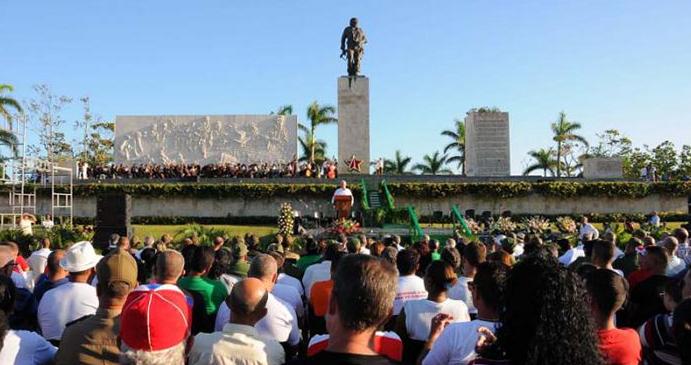
Thousands of residents from Villa Clara paid tribute to
the Heroic Guerilla and his compañeros in Bolivia, in a ceremony
October 8 which saw the younger generations reaffirm their commitment
to
continuing his legacy.
The same day the Cuban people once again expressed
their love for
Ernesto
Che Guevara, when over 60,000 people gathered in the
square bearing his name to honor the Heroic Guerilla and his
comrades in arms, on the 50th anniversary of his death.
The ceremony was attended by Army General Raúl
Castro Ruz,
first secretary of the Party Central Committee and President of
the Councils of State and Ministers of Cuba who, shortly before
the ceremony, and together with other Party Political Bureau
members, paid tribute to the Heroic Guerilla and the
Reinforcement Detachment at the memorial erected in their
honor.
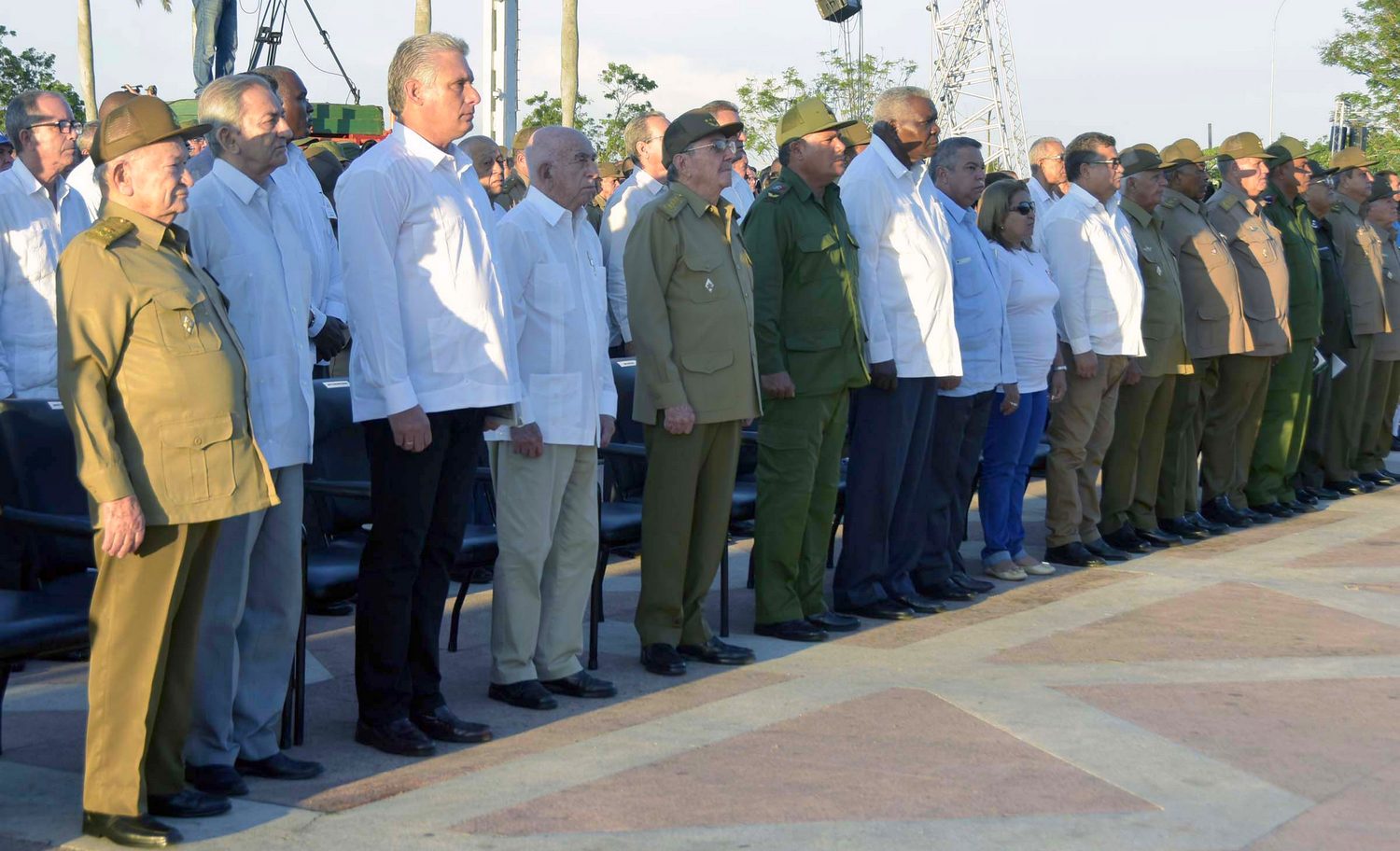
The words of Fidel at the solemn wake, when he
announced the
sad news of Che's death to the people of Cuba, could be heard
once again, moving all in attendance:
"If we want the model of a person, the model of a human
being
who does not belong to our time but to the future, I say from the
depths of my heart that such a model, without a single stain on
his conduct, without a single stain on his action, without a
single stain on his behavior, is Che! If we wish to express what
we want our children to be, we must say from our very hearts as
ardent revolutionaries: we want them to be like Che!"
This oath, "We will be like Che!" was then repeated by
50
elementary school children who were presented with their blue
kerchiefs identifying them as members of the José Martí
Pioneers
Organization.
During the ceremony, ninth grade pupil Leyanis
Águila, and
pre-university student Sara Mary Vega, spoke on behalf of Cuba's
new generations who have grown up with the example of Che, and
who have the enormous responsibility of continuing one of his
greatest legacies: the Cuban Revolution.

Artists from the province paid homage to the
Heroic
Guerilla, performing songs and reciting poems dedicated to
Che.
Also participating in the political-cultural section of
the program were
members
of the Party Political Bureau, the Central Committee Secretariat,
and vice presidents of the Councils of State and Ministers, as
well as senior officials from the Party, government, youth and
mass organizations, Ministry of the Revolutionary Armed Forces,
Ministry of the Interior, and others.
Relatives of Che and his compañeros in Bolivia
were also
present, as well as a delegation of combatants from the invading
columns of the Battle of Santa Clara.
Che's Colossal Example Lives on and Multiplies Day
After Day
Miguel Díaz-Canel
Bermúdez, a member of the Party Central Committee Political
Bureau and first vice president of the Councils of State and Ministers
of Cuba, gave a speech to the commemoration in Santa Clara where he
highlighted Che and his heroism, dedication and principles as an
outstanding example for the Cuban people to emulate.
***
It is with great emotion that we gather here at this
sacred place of the homeland to pay tribute to the protagonists of one
of the most important internationalist exploits, an example of the
struggle for the liberation of peoples subjected to imperialism, said
Díaz-Canel Bermúdez. He added that still today, the feat
undertaken by Comandante Ernesto Guevara and a small but brave army
during an 11-month campaign in Bolivia, moves tender-hearted men and
women across the world.
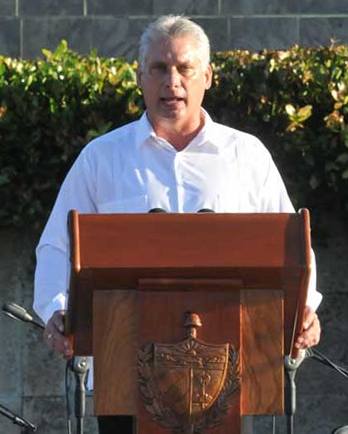 Recalling the landscapes
where he struggled between
life and
death, firm in his redemptive commitment, proves to us his
altruism, the depth of his convictions, his legacy, his
revolutionary and internationalist dimension, he added. Recalling the landscapes
where he struggled between
life and
death, firm in his redemptive commitment, proves to us his
altruism, the depth of his convictions, his legacy, his
revolutionary and internationalist dimension, he added.
"Today we commemorate the 50th anniversary of his fall
in
battle, on October 8, 1967. Without surrendering, after putting
up a heroic resistance, wounded and his gun rendered useless, he
was able to be captured.
"His captors cared nothing for the dignity and
etiquette
his
revolutionary legacy demanded, and [he] was vilely murdered; but
history only remembers the cowardice of those murderers, while
the colossal example of Che lives on and multiples day after
day," noted the Cuban official.
Díaz-Canel went on to recall that on announcing
the bitter
and painful news of Che's death to the people of Cuba, Fidel
described him as the most extraordinary of our compañeros of the
Revolution.
In addition to his qualities as a revolutionary, the
Party
Political Bureau member also spoke about his convictions and
values, forged in the struggle, which would see him become an
exceptional revolutionary, and a special man with a very unique
outlook on life.
Fidel, Raúl, Almeida, Camilo, Ramiro, and other
compañeros
from during and after the guerilla struggle, as well as the Cuban
people, saw and recognized in Ernesto his simplicity, sincerity,
camaraderie, his reckless willingness to do the most difficult
tasks, his prestige as a leader, teacher and artist of the
revolutionary war; tireless in his commitment and willingness to
struggle until victory or death, for the freedom of the peoples,
stated the Cuban official in his remarks.
Che hasn't died like his murderers wanted, his figure
continues to grow with time as new generations of Cubans -- raised
under his example and that of his legacy -- discover, recognize
and assume his paradigm as a revolutionary.
They make his eternal call to the sanctity of study,
work and
fulfilling one's duty, their own. His example of an altruistic
man becomes an ideal to follow, noted Diaz-Canel, who went on to
explain that as a leader and Minister, Che was able to apply new
management methods to the industry sector, while his example and
rigorous system of control and discipline instilled commitment in
his subordinates.
He also constantly encouraged the professional
development of
workers and cadres. He created factories and also trained
revolutionaries.
He was a tireless seeker of truth and reason in order
to
advance in the construction of socialism. As well as a director
and guerilla, he was also a revolutionary thinker, a humanist, an
intellectual who understood the need to reflect on the
Revolution, socialism, society, and the Cuban people, noted the
official.
"He appears in our history as a hero of the Granma
expedition, the Sierra, the invasion and battle of Santa Clara,
as one of our most illustrious and sacred leaders, as well as a
chronicler and researcher of history, because he understood that
history is a great teacher."
Che warned us that the present cannot become a return
to the
past and that in order to construct the future we must always
remain united, he added.
It is true, noted Díaz-Canel, that today Che is
a moral giant
for people of different ages and for youth across the world who
find in his unwavering example, his sense of honor and dignity,
in the bravery and austerity that characterize him, the
inspiration to build a better world.
"This is why Fidel, in the solemn wake held in honour
of
his
death, described Che as a true model of a revolutionary, as a new
man to which we must aspire."
What we cannot allow is for this idea to turn into an
empty
phrase, into a simple repeating of words; it must be assumed
through commitment, through inspiration, through conviction.
We must give true substance to the call to be like him,
in
order to be able to face all life's challenges, stated the Cuban
official.
We grew up knowing that he had been murdered, of his
heroic
death, constantly fighting, dignified and firm before his
captors, with his last thought for Fidel and this people that
love him like a son and who didn't know where he was but held the
hope that one day he would return, stated Díaz-Canel.
"And he did return, after an intense poignant search by
a
formidable team of scientists. His remains were found and brought
to the homeland on July 12, 1997."
The Cuban vice president also recalled the words of
Che's
daughter, Aleidita and of Fidel at that time, when his remains
and those of his compañeros were laid to rest in the Plaza, 20
years ago.
He continued, stating that we are living in a world
full of
contradictions and uncertainties, at a time characterized by
growing threats to peace, when powerful interests of domination
predominate, the survival of the human species is under threat,
an unjust and exclusionary economic order exists. It is in this
current state of crisis that neo-liberal capitalism is attempting
to expand and turn the values of the people into something
out-dated and unnecessary.
What is happening in Latin America is an example of
these
colonizing processes and in our case an expression of the marked
interest in political and economic re-conquest, opening the door
to brutal capitalism, stated the Party Political Bureau
member.
Political interests in the sister Republic of Venezuela
are
attempting to prevent Venezuelans from freely exercising their
right to self-determination, with the United States applying
unjust sanctions.
However, faithful to our internationalist vocation, we
once
again reaffirm Cuba's support for the Bolivarian and Chavista
people and the government led by Nicolás Maduro, he stated.
"All together, these events are clear proof of what Che
said
when he explained that imperialism cannot be trusted, even a
bit."
Loyal to his legacy and to Fidel, we reaffirm that Cuba
will
not make concessions inherent to its sovereignty or independence,
nor will it negotiate its principles or accept conditions, as
changes are decided by the Cuban people, he noted.
Diaz-Canel also recalled that this traditional tribute
is
being held for the first time without the physical presence of
Fidel.
Fidel and Che will always be present because as two
individuals who share the same ideals, their profound knowledge
of the ills of the world, rebelliousness, anti-imperialist and
pro-Latin American stance, make them robust and unbreakable
examples to guide the battles of these times; the battles for
sovereignty and peace, for social justice, for true emancipation
and for socialism, stated Díaz-Canel.
As such, he added the Cuban people's response to
Hurricane
Irma and the following recovery phase are proof of the legacy
of their examples and values.
Here, today, from the historic Plaza and Memorial, a
space to
express our commitment and to honor with our results, a
must-visit site for those who believe in, aspire to and struggle
for a better world, we can affirm that an example can multiply
wills and that the future belongs to us, he stated.

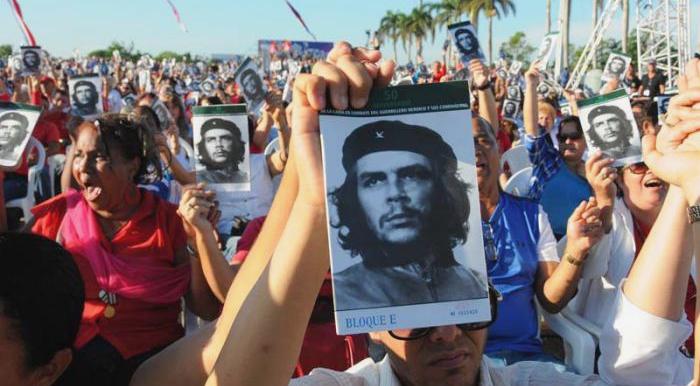

Tribute to Che Held in Ottawa
In Canada, a tribute to Che featuring speeches, music
and poetry was hosted by the Cuban Embassy in Ottawa on October 8, with
broad participation by friends of Cuba from Ottawa, Gatineau, Toronto
and Montreal.
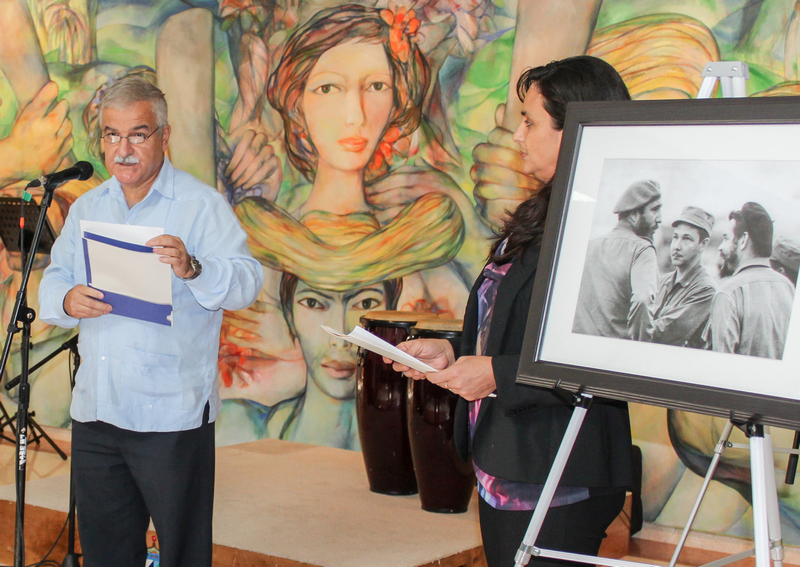 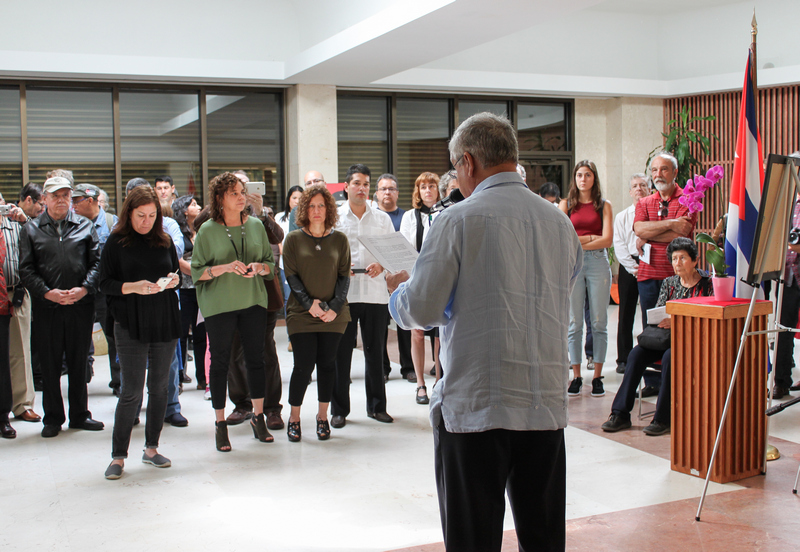
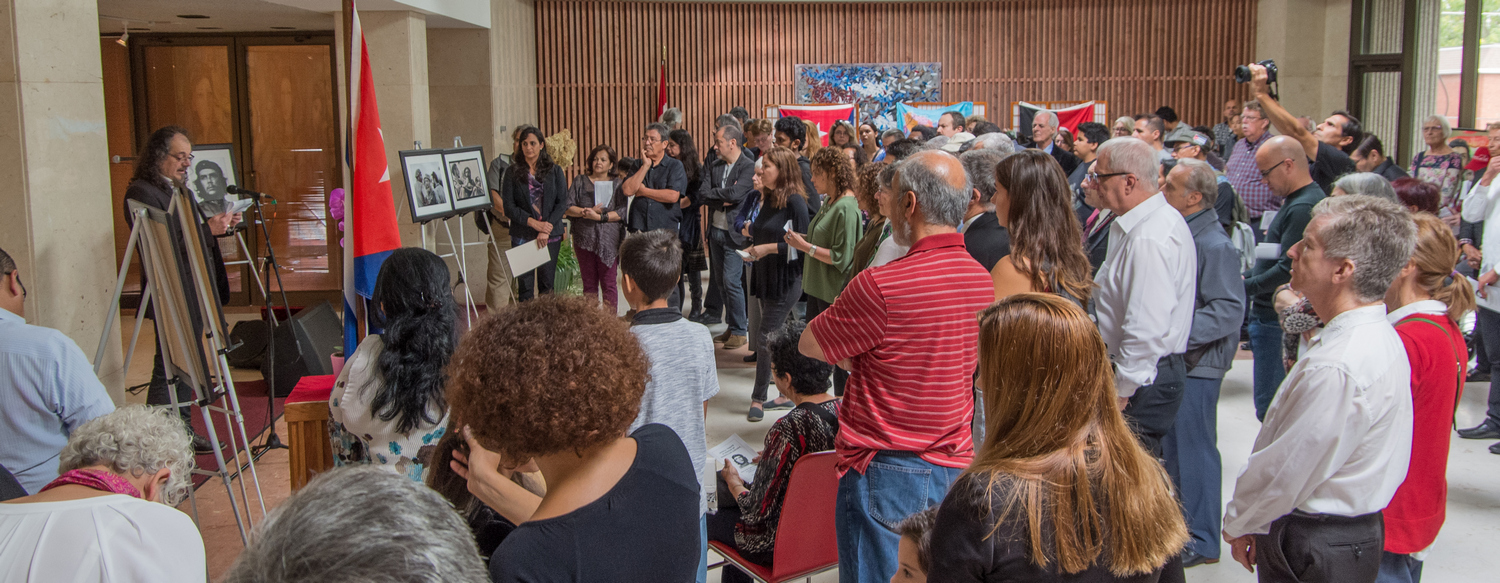
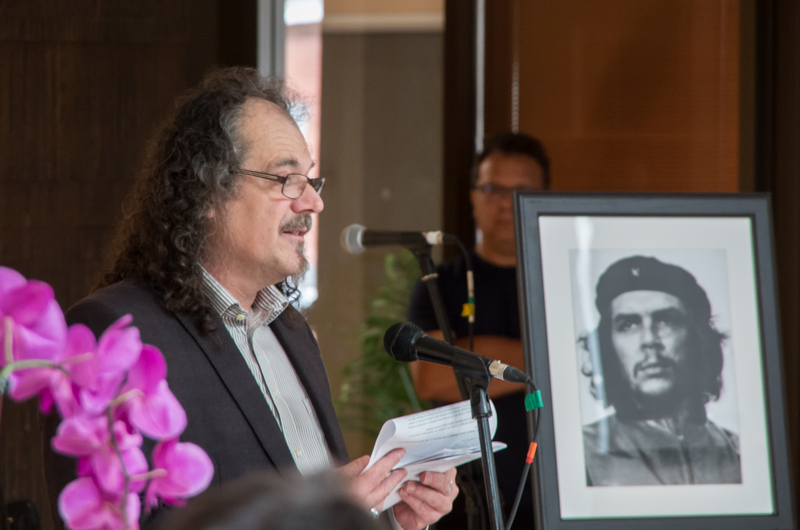 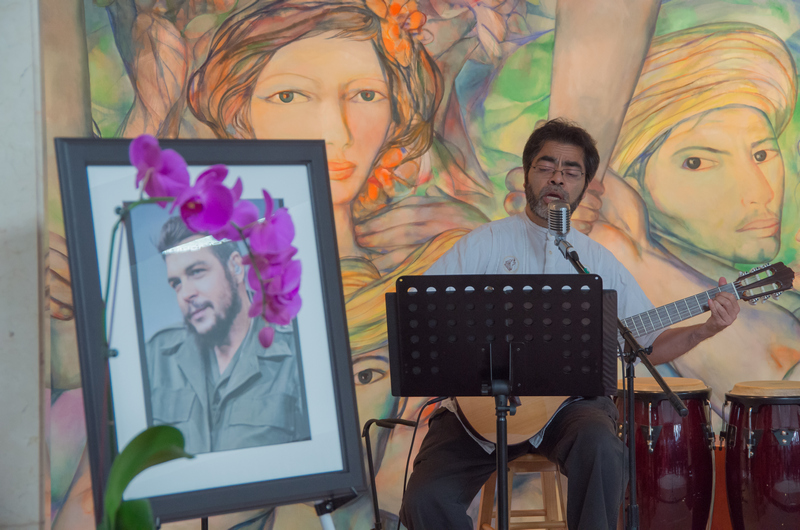
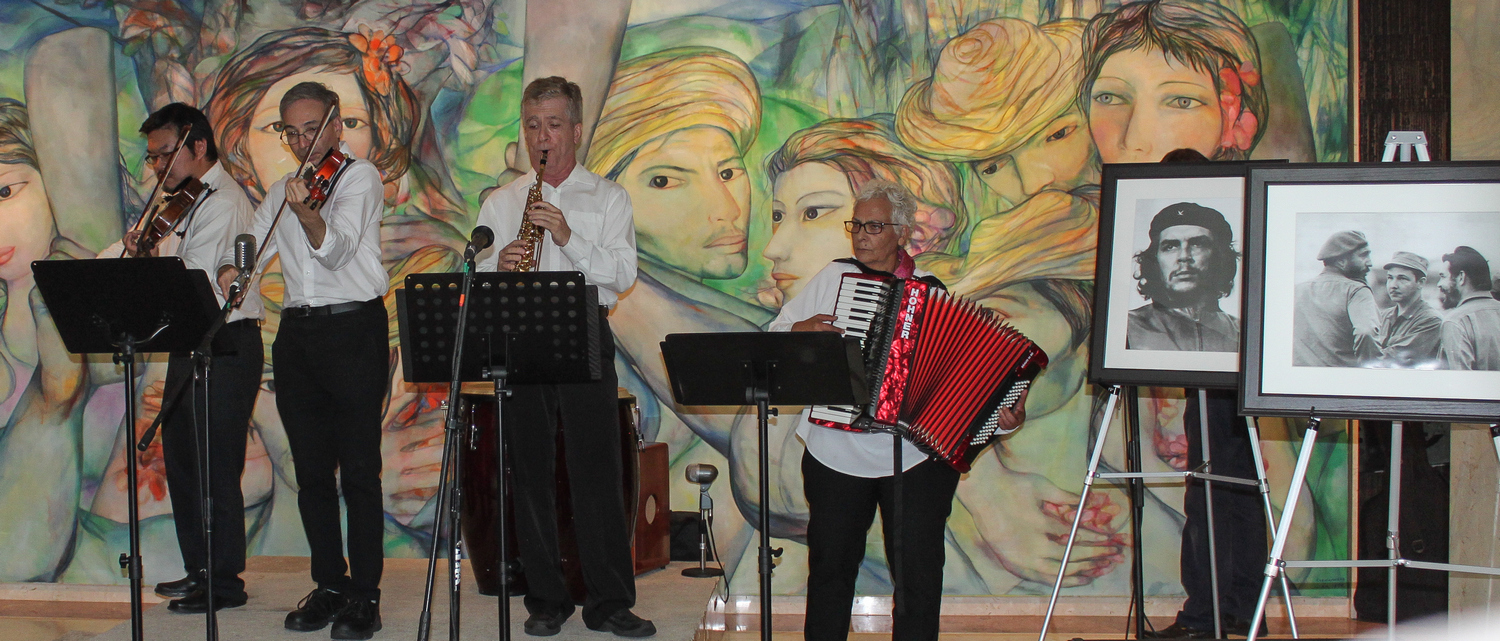
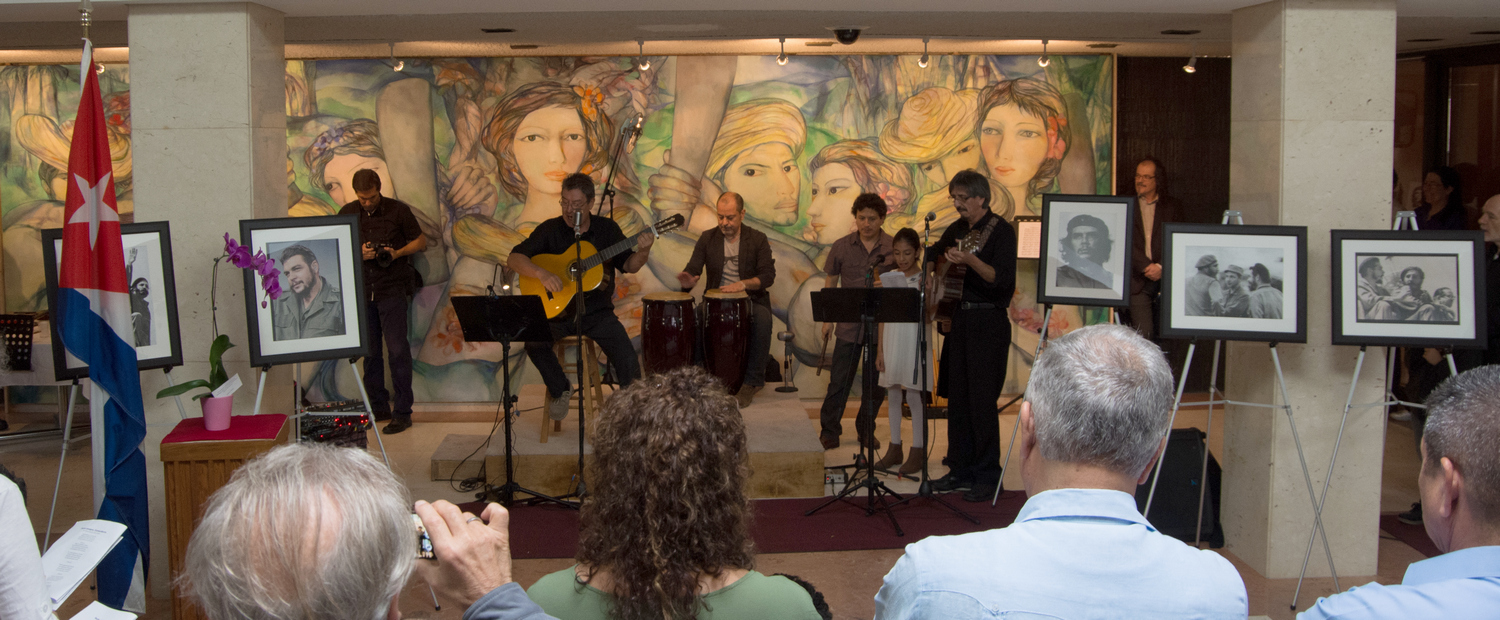

Coming Events
Vancouver
Charles Boylan -- Celebration of Life
Sunday,
October
15
--
2:00-4:00
pm
Marine Labour Centre,
1880 Triumph St
For information, contact Joseph Theriault at 778-846-3823
Ottawa
No to Foreign Interference in Venezuela's Regional Elections
Sunday,
October
15
--
1:00-2:00
pm
U.S. Embassy, 490
Sussex Dr.
Toronto
Respect Venezuela's Sovereignty
Monday,
October
16
--
3:30
pm
Foreign Minister
Chrystia Freeland’s Constituency Office, 344 Bloor St. W
For
more
information: Facebook
Toronto
Celebrate the Centenary of the Great October Socialist Revolution
Saturday,
November
4
--
7:00
pm
84 South Service Rd
(Unitarian Church), Mississauga
For
more
information: call Ann at 416-996-7979 or e-mail
centenary1917@gmail.com

PREVIOUS
ISSUES | HOME
Website: www.cpcml.ca
Email: editor@cpcml.ca
|

 Criticism to the United
States due to its slow pace in
responding to its responsibility to aid has been answered with
the statement that it was a problem of the Puerto Ricans. They
have now assigned a general to coordinate the aid. We are greatly
concerned about the militarization of Puerto Rico. Pro
independence forces have historically been persecuted and this
terror was part of the script that the armed forces used in
Puerto Rico.
Criticism to the United
States due to its slow pace in
responding to its responsibility to aid has been answered with
the statement that it was a problem of the Puerto Ricans. They
have now assigned a general to coordinate the aid. We are greatly
concerned about the militarization of Puerto Rico. Pro
independence forces have historically been persecuted and this
terror was part of the script that the armed forces used in
Puerto Rico.
 But as for the community in
the United States, we've
been
doing work for years around the connection between the colonial
situation of Puerto Ricans and the marginalization of Puerto
Ricans in the United States. So in particular I can speak to the
work that we've been doing in Chicago for the past 50 years,
creating a series of parallel institutions to serve the needs of
our community.
But as for the community in
the United States, we've
been
doing work for years around the connection between the colonial
situation of Puerto Ricans and the marginalization of Puerto
Ricans in the United States. So in particular I can speak to the
work that we've been doing in Chicago for the past 50 years,
creating a series of parallel institutions to serve the needs of
our community.






 Recalling the landscapes
where he struggled between
life and
death, firm in his redemptive commitment, proves to us his
altruism, the depth of his convictions, his legacy, his
revolutionary and internationalist dimension, he added.
Recalling the landscapes
where he struggled between
life and
death, firm in his redemptive commitment, proves to us his
altruism, the depth of his convictions, his legacy, his
revolutionary and internationalist dimension, he added.


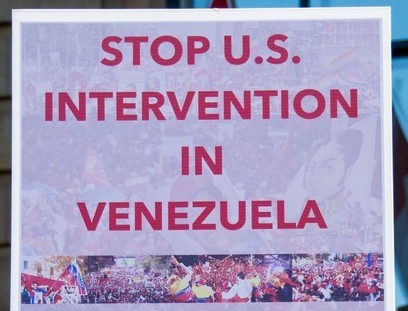



 Electricity, like other
forms of Canada's energy resources, comes under NAFTA's jurisdiction
and
is tariff-free between Canada and the United States. In fact, Canada's
major electricity generation and transmission grids have by and large
been constructed in order to serve the U.S. A contradiction has
emerged,
however, now that some Canadian provinces have already or will soon
eliminate coal-fired electrical production, or rely heavily on fossil
fuels for electrical generation, and do not have the infrastructure
required to import hydro-electric power from neighbouring provinces.
This is because to date those producing excess hydro-electric power
export the vast majority of it to the United States and do not have the
capacity required to transport it to neighbouring provinces.
Electricity, like other
forms of Canada's energy resources, comes under NAFTA's jurisdiction
and
is tariff-free between Canada and the United States. In fact, Canada's
major electricity generation and transmission grids have by and large
been constructed in order to serve the U.S. A contradiction has
emerged,
however, now that some Canadian provinces have already or will soon
eliminate coal-fired electrical production, or rely heavily on fossil
fuels for electrical generation, and do not have the infrastructure
required to import hydro-electric power from neighbouring provinces.
This is because to date those producing excess hydro-electric power
export the vast majority of it to the United States and do not have the
capacity required to transport it to neighbouring provinces. The Canadian government's
reversal of its position concerning the Ambassador Bridge indicates the
way in which deals are being made as part of the NAFTA negotiations
over strategic trade routes between Canada and the United States
without the participation or knowledge of Canadians. It should be
remembered
that the Trudeau government is also rushing to pass its Bill
C-23, An Act respecting the preclearance of persons and goods
in Canada and the United States, which will surely be used
to authorize the placement of U.S. Homeland Security agents on
Canadian soil to clear goods and people as they seek to cross the
current and new Ambassador Bridge as well as an eventual Gordie
Howe International Crossing unless that is abandoned altogether. It
is highly likely that part of the approval of the permits for the
Detroit International Bridge Company is linked to secret deals to
put in place as swiftly as possible pre-clearance at the
Windsor-Detroit border and on this basis give the U.S. control
over one of the most strategic Canada-U.S. border crossings.
The Canadian government's
reversal of its position concerning the Ambassador Bridge indicates the
way in which deals are being made as part of the NAFTA negotiations
over strategic trade routes between Canada and the United States
without the participation or knowledge of Canadians. It should be
remembered
that the Trudeau government is also rushing to pass its Bill
C-23, An Act respecting the preclearance of persons and goods
in Canada and the United States, which will surely be used
to authorize the placement of U.S. Homeland Security agents on
Canadian soil to clear goods and people as they seek to cross the
current and new Ambassador Bridge as well as an eventual Gordie
Howe International Crossing unless that is abandoned altogether. It
is highly likely that part of the approval of the permits for the
Detroit International Bridge Company is linked to secret deals to
put in place as swiftly as possible pre-clearance at the
Windsor-Detroit border and on this basis give the U.S. control
over one of the most strategic Canada-U.S. border crossings.
 The new law reflects the
fact
that more and more the
Canadian
state wishes to wield Canada's territory and resources as a
weapon against those the U.S. declares its enemies. Now economic
sanctions and a travel ban (inadmissibility to
Canada) can be imposed against anyone listed under the
The new law reflects the
fact
that more and more the
Canadian
state wishes to wield Canada's territory and resources as a
weapon against those the U.S. declares its enemies. Now economic
sanctions and a travel ban (inadmissibility to
Canada) can be imposed against anyone listed under the  Bezan also singled out
Venezuela. Canada recently imposed sanctions on 40 high level
Venezuelan government and state officials. Without the
Bezan also singled out
Venezuela. Canada recently imposed sanctions on 40 high level
Venezuelan government and state officials. Without the  After each mass slaughter
and amid the continuing
violence of
U.S. cities, a tenuous motive is usually trotted out for the
individual or individuals involved. A motive is supposed to
explain the act, possibly provide some comfort or meaning to
those grieving their horrible loss, and when some evil intent is
identified inspire revenge and a desire for strengthened police
powers. But regardless of the motive, life and violence carry on
as before because the state-organized dictate that might makes
right in the defence of class privilege and empire-building
declares no alternative is allowed, no new direction or
pro-social aim for the economy and society is permissible.
After each mass slaughter
and amid the continuing
violence of
U.S. cities, a tenuous motive is usually trotted out for the
individual or individuals involved. A motive is supposed to
explain the act, possibly provide some comfort or meaning to
those grieving their horrible loss, and when some evil intent is
identified inspire revenge and a desire for strengthened police
powers. But regardless of the motive, life and violence carry on
as before because the state-organized dictate that might makes
right in the defence of class privilege and empire-building
declares no alternative is allowed, no new direction or
pro-social aim for the economy and society is permissible. The U.S. is tearing itself
apart with its outmoded
motive,
aim and way of life based on class privilege and empire-building,
and is dragging down the world as well. The time is now for the
U.S., Canadian and Mexican working class and allies to stand up
to U.S. imperialism and be counted as part of this great humanity
and declare with conviction and determination to build the new
with a modern economy and aim to meet and guarantee the rights
and needs of all, where social love and peaceful relations
prevail amongst the peoples within North America and the peoples
of the entire world. The need to put an end to class privilege
and empire-building and withdraw the U.S. military from overseas
is paramount if humanity is to move forward and be allowed to
sort out problems peacefully.
The U.S. is tearing itself
apart with its outmoded
motive,
aim and way of life based on class privilege and empire-building,
and is dragging down the world as well. The time is now for the
U.S., Canadian and Mexican working class and allies to stand up
to U.S. imperialism and be counted as part of this great humanity
and declare with conviction and determination to build the new
with a modern economy and aim to meet and guarantee the rights
and needs of all, where social love and peaceful relations
prevail amongst the peoples within North America and the peoples
of the entire world. The need to put an end to class privilege
and empire-building and withdraw the U.S. military from overseas
is paramount if humanity is to move forward and be allowed to
sort out problems peacefully. Those in control of the U.S. from
the beginning have
been
obsessed with their aim to enlarge social wealth for themselves
at the expense of the many and to extend their empire throughout
the world, first by violently expropriating and stealing the land
of the Indigenous peoples and enslaving Africans, and gradually
moving their empire into other regions of North America and
beyond, expanding the domination and control of the
U.S. empire throughout the world.
Those in control of the U.S. from
the beginning have
been
obsessed with their aim to enlarge social wealth for themselves
at the expense of the many and to extend their empire throughout
the world, first by violently expropriating and stealing the land
of the Indigenous peoples and enslaving Africans, and gradually
moving their empire into other regions of North America and
beyond, expanding the domination and control of the
U.S. empire throughout the world. The ruling elite sing
happily of the freedom of the
individual. But that individual is trapped within an ideological
crib of anti-consciousness and not allowed to rebel. The people
are free to pursue happiness, free to pursue the accumulation of
private property and wealth, free to starve, free to be
unemployed, free to fend for themselves but not free to rebel,
not free to reject the ideological shackles of U.S. imperialism
and strike out on a new path through acts of conscious
participation in acts of finding out how to rebel and organize to
build the new.
The ruling elite sing
happily of the freedom of the
individual. But that individual is trapped within an ideological
crib of anti-consciousness and not allowed to rebel. The people
are free to pursue happiness, free to pursue the accumulation of
private property and wealth, free to starve, free to be
unemployed, free to fend for themselves but not free to rebel,
not free to reject the ideological shackles of U.S. imperialism
and strike out on a new path through acts of conscious
participation in acts of finding out how to rebel and organize to
build the new.

 There are currently 13,459
NATO troops and 11,000 U.S.
troops
occupying Afghanistan. The U.S. is in the process of sending
3,000 more troops to bring its total to 14,000, for a grand total
of nearly 28,000 foreign troops. U.S. Defense Secretary James
Mattis and NATO Secretary General Jens Stoltenberg recently met
in Kabul to affirm NATO's commitment to the Afghanistan mission
and the U.S. is mobilizing with others to continue the NATO
occupation and foreign interference there.
There are currently 13,459
NATO troops and 11,000 U.S.
troops
occupying Afghanistan. The U.S. is in the process of sending
3,000 more troops to bring its total to 14,000, for a grand total
of nearly 28,000 foreign troops. U.S. Defense Secretary James
Mattis and NATO Secretary General Jens Stoltenberg recently met
in Kabul to affirm NATO's commitment to the Afghanistan mission
and the U.S. is mobilizing with others to continue the NATO
occupation and foreign interference there.




 In his speech at the United
Nations, Trump indicated
the U.S.
is preparing for more war. He specifically threatened the
Democratic People's Republic of Korea saying, if the U.S. is
"forced to defend itself or its allies, we will have no choice
but to totally destroy North Korea." He then threatened the
entire world, claiming, "From now on, our security interests will
dictate the length and scope of military operation, not arbitrary
benchmarks and timetables set up by politicians. I have also
totally changed the rules of engagement in our fight against the
Taliban and other terrorist groups." This means the U.S. will
expand its attacks and justify use of drones and Special Forces
anywhere, anytime, in the name of fighting "terrorist groups."
Sovereignty is not the right of each country to determine its own
affairs, but the "right" of the U.S. to dictate and decide the
government in each country.
In his speech at the United
Nations, Trump indicated
the U.S.
is preparing for more war. He specifically threatened the
Democratic People's Republic of Korea saying, if the U.S. is
"forced to defend itself or its allies, we will have no choice
but to totally destroy North Korea." He then threatened the
entire world, claiming, "From now on, our security interests will
dictate the length and scope of military operation, not arbitrary
benchmarks and timetables set up by politicians. I have also
totally changed the rules of engagement in our fight against the
Taliban and other terrorist groups." This means the U.S. will
expand its attacks and justify use of drones and Special Forces
anywhere, anytime, in the name of fighting "terrorist groups."
Sovereignty is not the right of each country to determine its own
affairs, but the "right" of the U.S. to dictate and decide the
government in each country.
 The bill further requests a
plan for deployment of and
training with strategic weaponry, including dual-capable
strategic aircraft that can carry both conventional and nuclear
weapons, and increased Asia-Pacific defense capabilities and
visible presence of key U.S. military assets, including medium- to
long-range strike assets.
The bill further requests a
plan for deployment of and
training with strategic weaponry, including dual-capable
strategic aircraft that can carry both conventional and nuclear
weapons, and increased Asia-Pacific defense capabilities and
visible presence of key U.S. military assets, including medium- to
long-range strike assets.










